#if not the richness of King's narrative
Text
Korean school violence dramas are always like:
see this poor girl? she's been beaten everyday and dragged across the classroom floor because her mother sells fish. Look at her, she can't afford a new uniform because the rich bullies have torn hers and now she's coming to school in sportswear. Her family is about to be thrown out and she's just watched her older sister sleep with a loan shark to keep the family's debt at bay. She can't read, can't eat, can't think because she's poor and the bullies are ruthless.
HOWEVER...
being rich isn't fun because... when the rich bully goes home, he has to sit at the huge, beautiful dining table and eat alone because his father is too busy to eat with him. uwu.
#what do you mean -being rich isn't always fun?#you literally always have only problem#but you go out into the world and cause problems for EVERYONE ELSE!#i'm getting tired of this narratives that keep trying to give people sab stories and yet these same characters turn around#enact hell for others#bitch x rich#the glory#king of pigs#weak hero class#revenge of others#can't think of any other bully dramas#i am so fed up with this trope#evil people are evil#stop with the sad stories#it never works when what they're going through isn't half of the shit they put others through
15 notes
·
View notes
Text
youtube
#gypsy punk#music#Gogol Bordello#Wonderlust King#another thing I miss - travelling#*looking at the map in the background* been there and there and there...#(not rich - I just used being able to chat with and hang out with locals to my educational advantage#very much a 'new history of time' - so much for the idiot narrative that anyone in the military is just a bloodthirsty murderer#idk hanging out seems so much more fun to me so...#and Gypsies or Roma - depending on what the specific group preferred to be called - are easy to get along with#as long as you treat them like people and not shit - funny how my laundry came back fine but other's laundry had extra holes)#(don't be a dick to other cultures challenge right?)
4 notes
·
View notes
Note
Thoughts on how Catherine&Henry were portrayed in BSR?
Well, they were mainly portrayed in the background, right?
I think it's from Anne's perspective, so that's what we see and that's what we hear (from her...none of the historians seem to really comment on their relationship on an interpersonal level, as such, only re: the political ramifications, because the series was not about that, so...beyond Dr. Owen Emmerson saying Catherine underestimated Anne-- I don't think this went vice versa, but I think Henry underestimated Catherine and vice versa there, too...they don't really get into this in-depth, though).
So, Anne says they didn't love each other, and that's what Anne, here, believes. The real Anne did not comment on it much that is 'on the record', beyond that "the love she bore him was far greater than that of the late Queen". That is what she believed, or, if we're being skeptical, what she thought was circumspect to say she believed. That doesn't make it true, and I don't think the creators were trying to hoodwink viewers into believing that's true-- just that Anne did.
It's been a huge complaint on Instagram circles rn, which I don't wholly understand? Why are they swearing up and down the last thing they want in the world is yet another series from Anne's POV (it was the same song and dance last year, too), then watching a series that has promoted itself, from the jump, as one that is only from Anne's POV...and then are mad when it’s from Anne's POV?
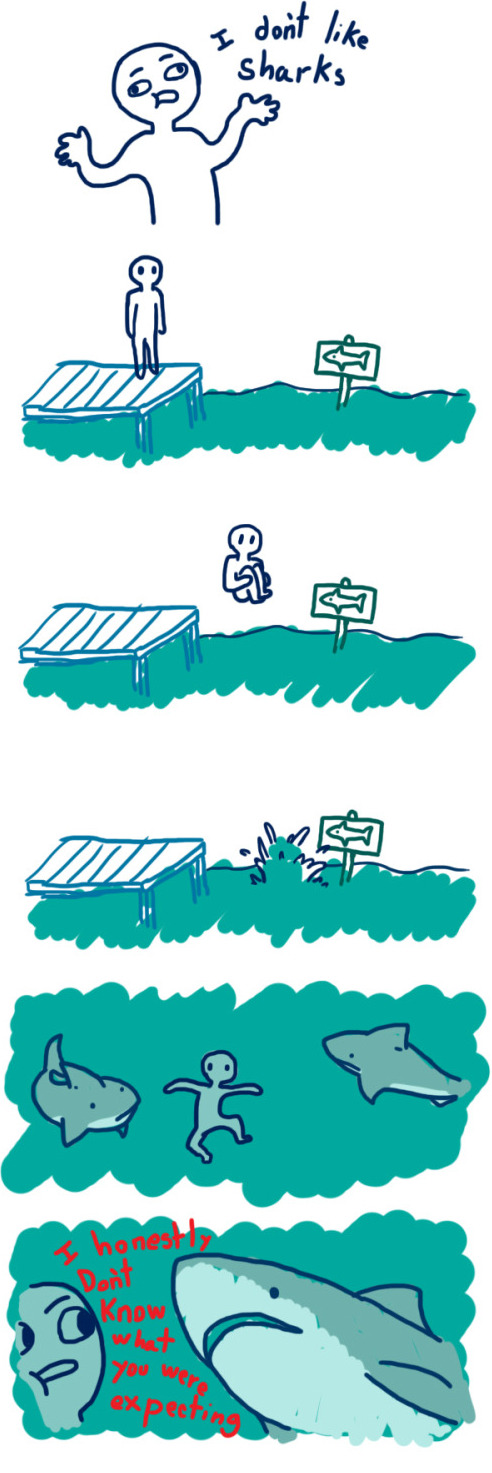
#anon#'we are very unreliable narrators of our own stories'#this is a narrative history. from one pov. it was absolutely billed that way.#catherine had her own rich inner world but anne was not privy to it. she was not her friend#absolute scenes in the comment sections. they FREAKED out when they saw catherine aggibbnfgawhfr#i am not of a mind to underestimate the intelligence of who watches this?#the vibe is like. very clear#you can tell if cable was still king this would be like the e! documentary of the tudors#we see anne's 'interview' reflection with kingston we see anne talking to the camera we see ; even#anne's nightmares... like .#when did you expect the switch to happen#when did you expect the woman that you all hate for her hostility towards her enemies ... to give them a 'fair shake' ?#sorry like...was she supposed to like a woman trying to supplant her?#anymore than catherine should have?#you're mad that the actress that plays catherine was 42 years old in this? catherine WAS in her forties during the GM#cope about it.
1 note
·
View note
Note
Thinking about König again.. help
Kissing him could be so narratively(?) interesting if the hood stays on. It’s a situation where you have to come to him - his face is his territory, it’s gonna be on his own terms. And like,, not lifting the hood away, but lifting it so that you can put it over your own head also - kissing him under it. Allowing yourself to be consumed by the shadows kind of, but he is ‘the shadows’ in this metaphor. I bet he’d get off on that
I absolutely love kissing König through the mask, I think there's something incredibly tender and trusting about it. Not forcing him to lift it, meeting him where he is and not half way. It's the same reason I love when fics kiss Ghost through his mask. It's a level of understanding, an willingness to say "you don't need to change I'll meet you where you're comfortable."
That said, joining him under the mask to kiss him? Also so so good. Lifting the hood just enough to duck under, tipping your head with your eyes squeezed closed, König leaning forwards to keep you both obscured as he kisses you... There's something very... two becoming one in the gesture. Not just meeting him, but joining him.
There are so many ways a first kiss can go, so many ways the second will build off it, and so much more to the third. Here's Medieval king!König kissing his gardener for the first time(despite having fucked her multiple times before this)
It's a quick motion, one that seizes you when you least expect it. Something tender grabs hold of your heart, indescribable and unwanted, and you grab the bottom of König's chain mask to pull him down to your height. You press your lips to the skin warmed metal, hope he can feel the pressure at least of your mouth against his, and hold him there. There's a brief frozen moment, König stands more still than you've ever known him, held at the edge of breath with his hands curling into tight fists by his side. You pull away, still feeling the cut of metal against your lips.
And he grabs you, rips his mask up and pulls you against his chest as his lips meet yours. His mask falls against your head, weighing you down and forcing your head to tip back to meet the fervid press of his lips. It's not the first time you've felt the warmth of them, but it's the first time they've felt so wanting. The first time they've felt almost crushing with the way König pushes them against yours, and yet it is still painfully chaste. Painful in the way it makes your heart clench, and your stomach flutter.
There is so much you've done with this man, so many ways he's taken you, and yet he kisses you so plainly. He kisses you like he's never had the pleasure of kissing anyone, and you can't say you have either, but you'd expected something so much different from him. You'd expected domination, tongue and teeth. You'd expected that he'd be colder, that he'd treat you with the same arms-length respect that allows you to leave his chambers after each night you spend with him. Instead you find a man as warm as the sun that beats against your skin and, perhaps, as desperate as you are for such simple affection.
He pulls back, tilts his head, and kisses you again, gentler this time. His arms still hold you tight, still warn you not to try and escape, but his lips slide against yours with a softness that steals the very air from your lungs. König sighs against your lips, your own parting to kiss him a fourth and a fifth time. Your arms find their way around his broad shoulders, your fingers dig into the rich material of his cape, and he kisses you, like it's the only thing he's ever wanted to do.
So that when you part a final time, and his tongue traces along the seam of your lips, you find yourself smiling and feel his lips curve to follow suit. My König, you think.
"Meine Herz," König murmurs. You shake your head. It's rather silly getting fluttery over something so simple. König fixes his hood back into place, and tips his head, pressing his chain covered lips to your cheek. "I'll be good," He tells you, "and you will kiss me again."
As if that simple act were some great reward. Maybe it was.
#cod x reader#x reader#x oc#cod x oc#könig x reader#könig cod#könig mw2#könig call of duty#König x oc#konig cod#konig x reader#konig mw2#konig call of duty#king!König#medieval au#oc: liebling
248 notes
·
View notes
Text
one aspect of queerness being an intrinsic part of deltarune that i love is the way suselle acts on some level as a metacommentary... you have this love story, and half of it is noelle, a rule follower, seemingly the golden girl but broken on the inside, essentially The Girl of deltarune. there are other girls, obviously. but as many have said before, noelle is clearly meant to embody many age-old female character archetypes. she's the lost girl with the troubled inner life. she's the golden girl, the town's sweetheart, the golden-haired, straight-as mayor's daughter. she's the damsel in distress, called out as such by multiple characters. she's the cheerful, ordinary girl next door. noelle is clearly part of the plan of deltarune's living narrative- the quintessential Girl for all the Girl roles.
and then you have susie, who's the polar opposite of that. she's loud, crude, messy, sarcastic, not afraid of a good old-fashioned fight. she manspreads in teacup rides, she swallows cakes whole and guzzles waterfalls of coffee. she calls herself a king. she is obviously and unapologetically BUTCH- and this clearly plays into her role as the one who defies the narrative. you can't tell susie where to go or what to do. you can't make decisions for her. she doesn't wait around hoping to be saved- she smashes through the prison walls herself. she's a knight in her own way! she's a girl, but she won't let ANYONE, including the narrative, tell her what that means for her. she defines it herself.
susie and noelle are opposites, not just appearance-wise or demeanor-wise, but in relation to their roles in the story. noelle is the narrative's perfect puppet, while susie breaks her strings and wrests control for herself. the story clearly wants noelle and susie to be nothing but a knight and her damsel (let's be honest, them getting together is obviously a part of whatever Big Plan is going on), a perfect fairytale king and queen.
but of course, there are no queer people in classic fairytales. the very fact that susie is not a man, but a loudly and proudly queer girl, is symbolic of the flaw in the grand plan- she can't fit into traditional narrative structures, and she sure as hell doesn't want to. instead of simply being the knight in shining armor who rescues noelle from danger and then hides her away in a different prison of riches and royalty for the rest of her days, susie is going to end up being the one who teaches noelle how to break free from the roles she's been forced into- how to twist those fairytales into her own epics.
and i just think that's neat!!
1K notes
·
View notes
Text
All For Us - Pt. 2 (Lewis Hamilton SMAU)
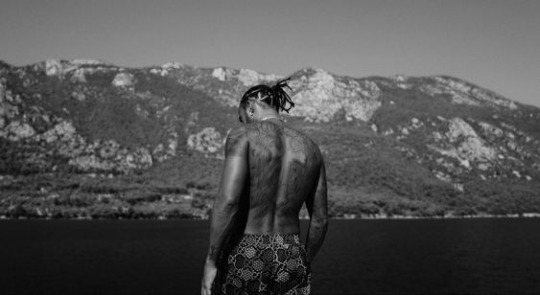
SUMMARY: Lewis Hamilton secretly dates an older woman with a daughter and the public slowly starts connecting the dots. [smau w/narrative]
PAIRINGS: Sir Lewis Hamilton x influencer!OC Bree King (faceclaim is Sasha Exeter)
WARNINGS: verbal/emotional abuse from an ex, drama, age gap romance (Bree is 2 years older than Lewis), formula one b.s., pre-established relationship, step-daddy Lewis. PLEASE READ THE WARNINGS!!
READ THE FIRST PART: here.....part three coming soon
TAGLIST: @cocobutterqwueen @httpsserene @mauvecherie-writes @galatially @pausmoon @a-moment-captured @yeea-nah @melodichaeuxx-lacritquexx @weetjy @lewisroscoelove @hxneyclouds @questionable-behaviour @lovebittenbyevans @tian-monique @alika-4466 @saintslewis @cherry2stems @planetmimi @woderfulkawaii @d3kstar @trinitoldyouso @scorpiobleue @certifiedlesbianbaddie @blveeeeeee @sugardontbesweet @omgsuperstarg @bluesole16 @serpenttines-library @peyiswriting @jasmindaughteroftheworld @motheroffae @hrlzy @xoscar03 @xsweetdellzx
A/N: Read the warnings!! Please let me know if you want to be added/removed from the taglist. The headers/dividers are by @inklore

The final race weekend of the season in Abu Dhabi had been a whirlwind of excitement so far for Bree, Lewis, and Sloane. They'd spent the last few days exploring the city's iconic sights and immersing themselves in the rich cultural experiences.
One highlight was visiting the stunning Sheikh Zayed Grand Mosque, its towering domes and intricate mosaics leaving them all awestruck. Sloane had been uncharacteristically quiet and well-behaved as their guide explained the significance of the sacred place.
"It's so pretty, Mommy," she'd whispered, eyes wide with wonder. "Like a palace for angels."
Lewis had gathered them both close, dropping kisses on each of their heads with a warm smile.
Another memorable experience was Lewis' daring skydive over the Palm Jumeirah islands. Bree's heart had lodged in her throat as she watched him exit the plane, that wildly free spirit of his on full display. But soon, his bright orange parachute had blossomed, carrying him down safely to the ground.
"That was amazing!" he'd crowed upon rejoining them, scooping Sloane up into his arms. His face was flushed with adrenaline, eyes sparkling. "Your turn next time, princess!"
Sloane had merely giggled and shaken her head adamantly at the idea.
After Lewis' free practice session and media duties were over, he surprised Bree and Sloane by taking them to a beautiful horse ranch just outside the city. Sloane had recently become fascinated with horses, and her eyes grew wide with excitement when they pulled up to the sprawling stables.
"We're really going to see the horsies?" she asked, gripping Lewis' hand tightly as they walked through the entrance.
Lewis grinned down at her. "Of course, princess. Anything for you."
A shriek of pure joy escaped Sloane as they approached the stalls, the gentle giants peering out at the newcomers with curiosity. She raced ahead, eager little hands outstretched to pat their velvety noses.
Bree hung back, content to watch the joyful scene unfold before her. Seeing Lewis and Sloane together filled her heart to bursting. He doted on her daughter so naturally, as if she were his own flesh and blood.
A little while later, Sloane was confidently mounted on a sweet pony, listening raptly to the trainer's instructions as they walked the paddock area. Lewis settled on a nearby bench, draping his arm around Bree's shoulders as they observed her daughter's riding lesson.
"She's a natural, isn't she?" he murmured, pride coloring his rich tone.
Bree hummed in agreement, leaning her head against his solid chest. "She really is. You may have started something here."
"Well in that case..." Lewis paused, turning his head to press a kiss to her hair. "I'm going to buy her a pony."
Bree's head whipped up, eyes widening. "No way. Lewis, you can't just buy Sloane a whole pony!"
He arched one brow stubbornly. "Why not? She's taken to it so well."
"Because!" Bree protested with an exasperated laugh. "She's eight years old. What are you trying to do, spoil her rotten?"
"Yes," Lewis stated simply, that infuriatingly handsome smirk playing over his lips. "Why can't I spoil my princess?" Bree opened her mouth to argue, but Lewis kept talking. "Sloane wants to get serious about riding, yeah? So let's nurture that talent. She could be an Olympian someday if she sticks with it."
Bree bit her lower lip, wavering. He did have a point - her daughter was displaying a remarkable natural ability.
"Let's just...think about it, okay?" she hedged. "This is a huge responsibility, not some passing toy phase."
Lewis made a show of mulling it over, but the obstinate glint in his eyes told Bree the decision was already made in his mind.
"Alright, alright," he conceded airily. "But I don't know, love...Sloane might be getting that pony after all."




Early December brought the first flurries of snow to the ground as Sloane celebrated her 9th birthday. Bree had gone all out with a Parisian theme, inspired by their summer trip to France.
Lewis was on kid-wrangling duty, making sure the gaggle of energetic children didn't inadvertently break anything in Bree's tastefully decorated townhome. As Bree emerged from the kitchen with a fresh round of juice boxes and snacks, the doorbell rang insistently.
"Can someone get that?" she called out. When it rang again, she sighed and carefully made her way through the living room.
In the corner, Lewis was engaged in an elaborate tea party with Sloane and a few of her friends. The other mothers in attendance openly ogled his athletic frame, seeming entranced by his easy interactions with the children. Bree just shook her head at their antics.
Opening the front door revealed her ex-husband Tom, present in hand with a young woman at his side. Bree's eyes immediately raked over the girl - she couldn't have been more than a few years out of college at most.
"Bree," Tom greeted stiffly.
"Tom." She kept her tone clipped. "Sloane's inside."
Stepping aside, she allowed them entry. No sooner had they crossed the threshold than Lewis materialized with Sloane perched on his back, her giggles filling the air.
"Babe, I think we need more crepes—" His words cut off as he caught sight of Tom, the two men sizing each other up.
"Lewis," said her ex-husband with a tightlipped smile.
"Tom," nodded Lewis in a flat tone, his facial features void of any emotion.
Since that fateful phone call months ago, Sloane's father had kept any communication with Bree brief and to the point - something Lewis silently approved of.
Bree's ex was a middle-aged white man, his dark hair showing hints of distinguished silver at the temples. As Lewis set Sloane down, the little girl rushed to hug her dad before pulling back, brows furrowed suspiciously at the young woman.
"Who are you?" she asked bluntly.
The woman flushed, mouth opening and closing. "I...um..."
"This is Talia, sweetheart," Tom supplied quickly. "Daddy's...friend."
Sloane slanted the woman a calculating look that seemed far too mature for her young age. Then, without another word, she whirled and rejoined her friends.
Soon it was time for the birthday festivities. As Sloane blew out her candles amid a chorus of off-key singing, she tore into her gifts with unbridled glee.
Tom's present was an exquisitely detailed dollhouse, complete with miniature furnishings and figurines. Sloane's eyes shone as she examined every facet of the ornate toy intently.
"My turn next, princess," Lewis announced with a wink. "But you'll need to put your coat on for this one."
The children immediately began scrambling to bundle up, parental chaperones trailing behind curiously. Once outside, Lewis led them around to the front of the house where an elderly handler stood beside a gorgeous chestnut pony, all saddled up and ready to go.
Sloane's shriek of pure delight was like music to Lewis' ears. Tears streamed down her flushed cheeks as she dashed forward to stroke the pony's back, whispering hushed greetings.
Quick as a flash, she pivoted and launched herself at Lewis, deceptively strong little arms locked around his neck.
"Thank you, thank you!" she cried, squeezing tightly. "This is the bestest birthday present ever!"
Over Sloane's shoulder, Bree beamed, heart swelling at the scene. But something in her peripheral vision caught her attention - her ex-husband, face mottled with rage, hands balled into white-knuckled fists at his sides.
She knew that look all too well from their marriage. This wasn't something he would simply forget or let go. Bree swallowed hard, trying to shake off the ominous chill that swept over her despite Sloane's obvious elation.
Oh no, she thought anxiously.

In the weeks following Sloane's birthday, things took an odd turn with her ex. He stopped responding to her texts and messages, leaving their child increasingly confused and hurt. When the scheduled week after Christmas for Sloane to stay with him came around, Tom was a complete no-show, ghosting his own daughter.
Bree was incredulous, barely able to contain her outrage at Tom's selfish behavior. She immediately forwarded copies of all her attempted communications to her lawyers, though it did little to soothe her anger. With nothing else to be done, Bree decided a change of scenery was in order for the holidays.
"How would you like to join Lewis and me in Brazil, baby girl?" she asked Sloane, who immediately perked up at the suggestion.
Lewis was overjoyed when they arrived, sweeping Sloane up into his arms with a rumbling laugh. "There're my two favorite ladies! Ready for some fun in the sun?"
Their time in Brazil was like a dream. After visiting Sao Paulo, they made their way to the beaches of Rio de Janeiro, taking in all the iconic sights along the way.
While Bree treated herself to a well-deserved spa day at their posh beachfront hotel, Lewis took Sloane out to experience more of the city's wonders. His original plan was a solo outing…but having Sloane there somehow made it even more special.
"Where are we going?" Sloane asked, skipping excitedly beside him as they wandered the upscale shopping district.
Lewis winked down at her. "You'll see, princess. It's a surprise for your mum."
When they arrived at the iconic Tiffany & Co storefront, comprehension blossomed over Sloane's face. She gasped, delighted giggles bubbling up.
"We're getting Mommy a ring!" she whispered conspiratorially.
Lewis just grinned and led her inside, informing the sales associate that he had an appointment. They were ushered into a private viewing room where a jewelry expert awaited with several trays of glittering ring selections.
Sloane immediately clambered into the chair beside Lewis, back ramrod straight with the importance of her role. As the sales associate took their drink orders, she piped up, "Apple juice on the rocks, please!"
The woman's tinkling laugh filled the room. "You got it, miss!"
While they waited, Lewis turned to Sloane with a serious expression. "You know what we're doing here?"
She nodded sagely. "Picking out a ring for Mommy so you can ask her to marry you."
A lump formed in Lewis' throat at her childlike innocence and perception. "That's right, princess. Would you like to help me choose?"
"Yes!" Sloane exclaimed. She leaned in, examining each tray with a furrowed brow that looked charmingly out of place on her young features. Finally, her eyes landed on a breathtaking princess-cut solitaire, its envious facets glimmering even in the muted light.
"What about that one? It's really pretty."
Lewis followed her line of sight, heart stuttering at the exquisite ring. "You like that one?"
Sloane nodded firmly. "Do you think Mommy will too?"
A slow smile curved his lips. Of course his girl would have impeccable taste, even at her age. "Yeah, princess. I think your mum will love that one too."
Lewis signaled the jeweler, pointing out the dazzling princess-cut solitaire they'd selected. As the ring was securely packaged and the credit card transacted, Sloane leaned in close.
"When are you going to ask her?"
Tucking the precious cargo into his pocket, Lewis winked down at Sloane.
"Very soon, my girl. In fact…" He wrapped an arm around her shoulders, guiding her from the store. "Why not while we're still here in Rio?"
The brilliant smile that bloomed across Sloane's face was all the answer he needed.
------------------------------------------------
On their final night in vibrant Rio de Janeiro, Lewis had something special planned. He made reservations at one of the city's most exclusive rooftop restaurants, renting out the entire top floor for some luxurious privacy. The panoramic views overlooking the iconic Christ the Redeemer statue and twinkling city lights below were simply breathtaking.
Dinner itself was an indulgent multi-course affair, the finest Brazilian cuisine paired with delectable wine. As dessert was served, Lewis gave Sloane a conspiratorial wink, causing the little girl to perk up.
"Right," she piped up, shooting her mother a mischievous grin.
Bree's elegantly arched brows lifted in suspicion. "Okay, what are you two up to?"
"Mommy, I need to go to the bathroom," Sloane announced, tugging on Bree's hand insistently.
Sensing something was definitely afoot, Bree decided to play along and allowed her daughter to lead her away from the table. Once inside the restroom, Sloane made a show of taking an excessively long time before finally "finishing" and moving to the sinks.
As Bree washed her hands, she caught Sloane's eye in the mirror. The girl was primping and fluffing her hair unnecessarily.
"Yes, Mommy?" she asked sweetly when she noticed Bree's gaze.
"What's going on, Sloane Marie?" Bree asked pointedly, unable to hide her knowing smile.
Sloane just shrugged, the picture of wide-eyed innocence. "I don't know what you're talking about."
"Mmm-hmm…" Bree hummed, unconvinced but willing to let the surprise unfold.
When they returned to their private dining area, Bree's steps faltered. The floor was strewn with a smattering of vivid red rose petals, the candles glowing warmly. And right behind their table stood a makeshift backdrop with the words "Will You Marry Me?" illuminated in twinkling fairy lights.
Tears immediately pricked Bree's eyes as the realization set in. She lifted a trembling hand to her parted lips, breath catching in her throat. Turning slowly, she found Lewis watching her with an achingly tender expression, hand outstretched in wordless invitation.
Sinking shakily into the chair he guided her to, Bree's gaze remained locked on his as Lewis lowered himself to one knee before her. Her hands fluttered helplessly as he clasped them between his own, anchoring her.
"Breanna Yvonne Jamison…" Lewis murmured, using her maiden name in a way that unlocked a fresh torrent of tears. Cupping her face, he gazed at her with liquid warmth and adoration. "My whole life, I've chased the adrenaline rush of going faster, pushing every limit in pursuit of greatness. Yet you came into my world so unexpectedly, and showed me there's no greater achievement than the profound stillness, safety, and completeness I feel simply existing by your side." He brushed an escaped tendril of hair from her damp cheek, voice lowering to an impassioned rasp. "You and Sloane…you're my home, my heart, my everything. Without you, I'm lost, unmoored. So please, Breanna - will you make me the luckiest man on earth?"
Lewis slid from his pocket the dazzling Tiffany's solitaire he'd selected with Sloane's help, the glittering gem glimmering like a fallen star between their joined hands. Trembling, Bree could only nod fervently, a watery laugh bubbling up from her very soul as she choked out, "Yes!"
In the next heartbeat, Lewis surged up to claim her lips in a searing kiss, cradling her to him. The restaurant staff erupted into cheers and applause while Sloane launched herself at them both, wrapping her skinny arms around their entwined bodies in a fierce group hug.
And in that suspended, perfect moment, Lewis Hamilton knew he'd finally caught the elusive thrill he'd been chasing his whole life. It went by a million different names - joy, peace, unconditional love.
But mostly, it was called home.
--------------------------------------------
In the blissful afterglow of his proposal, Lewis had one request for Bree - that they keep their engagement under wraps for now, just between them and their innermost circle. A treasured secret to bask in before the inevitable media frenzy.
Bree agreed readily, already protective of this sacred new chapter. Just for a little while, she wanted to exist in their loved-up bubble untainted by prying eyes and external pressures.
So they returned from Brazil as an extremely happy yet outwardly unchanged couple, Bree's dazzling new ring discreetly hidden away, its sparkle reserved for private moments between her and Lewis. Sloane proved incredibly adept at keeping her lips sealed despite her giddiness.
Finally, a couple months later after Lewis' departure from Mercedes and move to Ferrari was announced, they decided the time was right - they revealed their joy to the world.
The collective meltdown was of internet-breaking proportions. Fans, media outlets, and even fellow drivers and celebrities lost their minds over the long-anticipated news of Lewis Hamilton's impending nuptials.
At the eye of that storm, Lewis and Bree remained untouchable, buoyed by the pure love and acceptance they'd found together. The noise and chaos hardly registered in their cherished new reality as fiances and soon-to-be family. They were already living in a storybook dream.




Mid-February found Lewis back at Mercedes HQ in England, diligently preparing for the start of the 2024 F1 season. Meanwhile, Bree was gathering her things to catch a flight to Italy for a luncheon with Peroni, the new sponsor of Scuderia Ferrari.
"Sloane, honey, come give me a kiss! My Uber is going to be here any minute," Bree called up the stairs.
Sloane came clattering down, and Bree enveloped her in a fierce hug before placing a kiss on her cheeks. She then did the same to her mother.
"Be safe and call me as soon as you land, dear," her mom instructed.
"I will, Mom. Love you guys!"
As Bree headed out the door, a figure approached from the side. "Breanna King?"
She paused, eyeing the stranger warily. "…Yes?"
Without another word, the person thrust an envelope into her hands. "You've been served."
Bree could only gape at their retreating form in shock. The Uber driver cleared his throat, snapping her back to reality as he began loading her luggage into the trunk. She slid numbly into the backseat and tore open the envelope with trembling fingers.
The papers inside were a summons - Tom was suing her for full custody of Sloane, citing neglect and declaring Bree an unfit parent.
"This motherfucker," the strangled curse tore from her lips as she scanned the accusations. It had to be a sick joke, some sort of retaliation for his bruised ego over the pony incident.
Hands shaking, she immediately dialed Lewis' number. He picked up with his usual warm greeting, but immediately recognized the thinly veiled panic in her tone.
"Bree? Love, what's wrong?"
"Tom is…he's suing me for full custody." Her voice cracked on the last words. "He's trying to take Sloane away, saying I'm neglectful and unfit."
There was a pregnant pause on the other end, the weight of her words sinking in.
"That motherfucker," Lewis growled, his protective fury evident. "He is not taking our little girl."
Bree swiped at the tears streaking her cheeks, eternally grateful to have this man's unwavering support and love.
"I can come straight to you," Lewis stated, the resolute timbre of his voice already soothing her tattered nerves. "We'll get the best lawyers money can buy, and fight this with everything we've got. I promise you, Bree - Sloane isn't going anywhere."
Squeezing her eyes shut, Bree willed herself to draw strength from Lewis' steadfast presence, even over the phone. He was right; they could and would get through this latest hurdle. Their little family was far too precious to let anyone tear it apart so easily.
"No, no, it's fine. I'm on my way to the airport now," she managed in a stronger voice. "But yeah...okay, I love you, Lewis."
"I love you too, baby. We've got this."
As the call disconnected, Bree felt a surge of determination replacing the initial panic. Tom King had poked the proverbial bear - and neither she nor Lewis would rest until this custody battle was won.
-------------------------------------------
Bree smoothed her hands down the silk blouse she had carefully selected for the luncheon at Scuderia Ferrari's headquarters in Maranello. Despite the glamorous setting and prestigious company partnership with Peroni, her mind couldn't seem to focus.
Tom had blindsided her by filing for full custody out of nowhere. As she mingled with the other influencers and Ferrari personnel, Bree wondered what had given her the strength to even make this trip to Italy rather than immediately raging hell at home.
The answer, as it so often was lately, was Lewis. His calm, reassuring presence had grounded her when the news first broke. Though clearly furious on her behalf, he had encouraged Bree to keep her head high and trust her lawyers as they prepared for the upcoming court session.
"Don't let that idiot ruin all your hard work, gorgeous," Lewis had stated firmly. "I've got your back no matter what, okay?"
And so here she was, determined not to let Tom's spiteful actions derail her life and commitments. As a Peroni ambassador, Bree pasted on her brightest smile and tried to immerse herself in the incredible experience of touring the legendary Ferrari factory.
She shared a laugh with Charles Leclerc as the young driver joked, "I guess I'll be seeing you around the paddock more often when Lewis joins the team next year!"
The comment simultaneously thrilled and unsettled Bree. Their engagement was still so new in the grand scheme of things, yet there was still so much going on, including Lewis' moving of teams, planning a wedding, and even discussing plans for their future. Despite this, everything felt inescapably right.
In the days that followed, Bree did her best to savor every moment of la dolce vita in Italy. She treated herself to a gorgeous new purse from a chic Milanese boutique, a small but meaningful splurge to mitigate the stress of the looming custody case.
Eventually, though, the time came to head to London and seek solace in Lewis' arms once more. They spent hours making love, trying to lose themselves in the heady oblivion of bare skin and tangled sheets.
Their lovemaking was slow and gentle as if they were trying to hold onto every precious second together before facing what awaited them outside these four walls.
"What if he takes her from me?" Bree couldn't stop the tremor of fear in her voice as she lay nestled against Lewis' chest afterward. "Tom's such a cruel, vindictive person…who knows what lies he'll try to spin about me."
Lewis stroked her hair soothingly, pressing a kiss to her temple. "I won't let that happen, I promise. Is there anything really damning in his past we could use? Any shady business or indiscretions that could discredit him?"
Bree shook her head with a humorless laugh. "Besides being a bastard of a human who can't keep his dick in his pants? Not really. He's an utterly mediocre person, which is almost more maddening."
"Alright then," Lewis said, resolution steeling his tone. "If he wants to fight dirty, we'll be prepared to get dirtier. I'm going to have someone do some digging, just to be safe. Cover all our bases."
Bree opened her mouth to protest, but Lewis cut her off with a tender kiss.
"Don't argue, gorgeous. Let me handle this, okay? You and Sloane are my family now. I'll do whatever it takes to protect you both."
The fierceness in his gaze made Bree's breath catch. She simply nodded, fresh warmth blooming in her chest.
As if on cue, Lewis' phone buzzed to life with a text notification. He glanced at it and smiled.
"Speaking of family…Sloane and your mum just landed. I hope you don't mind, but I may have arranged for them to visit us for a little while."
Bree's eyes widened in surprise. "You did what? Why would you—"
"Because I want my family here with me," Lewis answered simply, cupping her face. "We're a team now, remember? No more going through the hard stuff alone. I've got us."
As he pulled her into a fierce embrace, Bree felt the last remnants of fear and anxiety slip away. No matter what curveballs life threw their way, they would face it head on - together.




The courthouse corridors were hushed and intimidating as Bree strode through them, Lewis' reassuring hand clasped firmly in her own. He had insisted on accompanying her for moral support, even though it meant cutting things perilously close for pre-season testing in Bahrain in two days.
Using a discreet back entrance to avoid prying eyes, they made their way into the designated courtroom and took their seats on the defendant's side. Bree stared across the aisle with a disapproving headshake as her poor excuse for an ex-husband slouched arrogantly in his chair.
Her lawyer, Marcus, placed a tender hand on Bree's shoulder. "Don't worry, we have more than enough evidence on our side to dispute all of his ridiculous claims."
Lewis's insistence on hiring a private investigator to dig into Tom's background had paid off tremendously. They now had proof that, rather than being away at "work conferences" as he claimed, Tom had actually been partying it up with his latest fling, Talia.
The court clerk called them all to order as the judge entered and took her seat. After a brief overview of the case and opposing claims, Tom's attorney launched into his diatribe.
"Your Honor, my client simply wants what's best for his child," the weaselly-looking man began. "Ms. Jamison is an unfit mother who routinely leaves her daughter home alone to gallivant across the world, attending frivolous racing events with her athlete boyfriend."
Bree tensed, but Marcus was already on his feet, armed with printouts of text conversations, photos and more.
"I object, your Honor. We have ample evidence that Ms. Jamison's daughter Sloane was never left unsupervised. She was either in the care of her maternal grandmother or accompanied her mother, along with Mr. Hamilton, on any travel."
The judge narrowed her eyes at Tom's lawyer. "Well? Do you have proof to counter these claims?"
A tellingly uncomfortable silence lingered in the room before the man eventually muttered, "No, your Honor."
"Then I suggest you adjust your angle, counselor," the judge responded sternly. "This does not appear to be a case of abandonment."
Marcus pressed on, conviction in his tone. "The fact is, Mr. King is the one guilty of being an unfit, absentee parent. We have records showing he has consistently missed scheduled visitations with his daughter, instead choosing to wine and dine various romantic distractions."
As damning evidence continued to mount against Tom, Bree could see him slowly deflating in his seat, any bravado evaporating. By the time Marcus concluded his case, it was clear how the judgment would swing.
"Ms. Jamison will maintain full custody of their daughter, with Mr. King still allowed supervised visitation per your original schedule," the judge decreed. "However, let me be very clear…" She fixed Tom with a stern glare. "If you miss three scheduled visits without a legitimate excuse, you'll be back in front of me facing harsher penalties. This appears to be a case of bruised ego more than genuine concern for your child's welfare."
Her gaze softened slightly as it moved to where Lewis sat stoically beside Bree.
"You should be grateful that your daughter has another positive male influence in her life who is so invested. Not many children are that fortunate. I suggest letting go of this petty jealousy act before it damages your relationship with your child further."
As the courtroom cleared out, Bree finally allowed the tears of relief to spill over. She clutched desperately at Lewis, overwhelmed by the punishing stress of the entire ordeal finally being lifted.
"It's over, gorgeous," he murmured, rubbing soothing circles across her back. "You and Sloane are safe, I promise. Let's go home, back to our little family."
Pressing her face into the comforting warmth of his neck, Bree knew those words had never rung true. She had fought for the family she deserved - and somehow, against all odds, she had won.

Weeks followed the custody hearing, Tom had surprisingly upheld his end of the agreement without incident. As Spring Break approached, he was set to have Sloane stay with him for the full week - a stretch of time Bree admittedly felt anxious about.
She moved efficiently around her bedroom, packing a final suitcase for the upcoming trip to New York, Seoul, and Shanghai. She would be accompanying Lewis between his own obligations, a welcome constant amid the whirlwind travel.
Downstairs, Tom sat nursing a glass of water while Lewis sat nearby, the two men united in an uncharacteristic silence. Finally, Lewis cleared his throat.
"Listen, we've never really had a chance to clear the air, man-to-man," he began. "I just want you to know that I love Bree and Sloane with everything in me. Hurting them is the last thing I'd ever want."
Tom's jaw tensed minutely before he exhaled a resigned sigh. "I know that now. And I actually…appreciate you, believe it or not."
He glanced up to meet Lewis' curious stare. "You stepped up as the kind of stand-up father figure I never could be to my own kid. I was too selfish and wrapped up in my own bullshit."
A somber pause lingered before Tom continued. "Have you two discussed… permanent living situations yet? With you being based in Monaco and all?"
Lewis nodded slowly. "Bree brought it up, the idea of us all being there together once we're married. Home for me is wherever she and Sloane are, but Monaco would make the logistics easier."
"And what does Sloane think about that?" Tom asked, surprising Lewis with a hint of paternal interest.
The race car driver couldn't help but chuckle. "Well, her main condition was that we have to bring her pony, Buttercup."
Tom barked out a startled laugh at that. "Sounds about right for my drama queen. She actually loves that damn pony more than her own father…"
The two men shared a look of mutual understanding - their first real moment of camaraderie. Maybe things were finally evening out between them.
"For what it's worth…" Lewis continued carefully. "Bree's nervous about the idea of relocating. I don't want to overstep, but I think she's worried it could impact your time with Sloane."
Tom waved a dismissive hand. "Do what you gotta do, man. As long as I still get to see my kid, I'll make it work on my end. Just…don't fuck this up like I did, alright?"
The sound of footsteps on the stairs interrupted their conversation. Bree descended into the living room, Sloane close on her heels, eyeing the two men suspiciously.
"You two playing nice?" she asked Tom pointedly.
He offered her a small smile and nod. "Yeah…everything's fine, Bree. We're good."
Sloane took the opportunity to run over and squeeze Lewis tightly. "I'm gonna miss you, Lewis!"
"I'll miss you too, princess," he murmured, pressing a kiss to the top of her head, "but I'll be back before you know it, okay?"
As Sloane pulled away, Tom took the chance to lean in close to Bree. "For what it's worth…I really am sorry. For everything," he muttered lowly. "You deserve to be happy."
Surprise flitted across Bree's features before she managed a warm smile. "Thank you, Tom. That means more than you know."
With the goodbyes and well-wishes exchanged, the couple departed. Bree felt the tension seep from her shoulders as they pulled away.
This was just the start of an exciting new adventure - and she couldn't wait to experience it all with Lewis by her side.
-----------------------------------------------------
A few days later, Bree found herself arm-in-arm with her dashing fiancé as they strode the purple carpet ahead of the GQ Global Creativity Awards in New York. She watched with a swell of pride as Lewis knocked out interview after interview with his characteristic charm and professionalism.
Finally, they were able to slip inside, where Bree was delighted to catch up with Mellody Hobson. The two embraced warmly before Mellody's husband, the iconic George Lucas, offered his hand to Bree.
"It's wonderful to finally meet you in person," the legendary filmmaker greeted. "I've heard so much about you and your daughter from Mellody."
Bree felt her cheeks warm slightly as George's warm gaze appraised her. "I bet you have. Did you hear about the whole pony story?"
At the mention, Lewis was already pulling out his phone, queuing up snapshots of Sloane on her pony as he spoke. "Isn't she a natural? I keep telling Bree that Sloane could be a future Olympian at this rate!"
George chuckled, studying the images with an approving nod. "She definitely has the makings of one. You'll have to keep me posted on her progress."
As the two men enthusiastically discussed Sloane's budding equestrian skills, Bree felt a contented glow settle over her. Seeing Lewis so embraced in this extended family circle, so openly smitten with her daughter, felt like a premonition of the wonderful future that lay ahead for all of them, if she and Lewis could just hold on to this feeling forever.




Final part will be out soon….
#emjayewrites#sir lewis hamilton#lewis hamilton#lewis hamilton fanfic#sir lewis hamilton x black!reader#lewis hamilton x black!reader#all for us#f1 x black!reader#f1 x reader
203 notes
·
View notes
Text
btw my personal theory for what blitz is gonna do/say that makes stolas so angry at him is confess that when they were kids blitz was only brought to be his friend to steal from him. and not only admit this, but double down on the lie that this IS just transactional sex with absolutely nothing more beneath the surface by pressing in that point. that the only thing he's ever cared about getting from stolas is wealth; he was never going to be with him, he was never his friend.
i've been racking my brain trying to figure out what the hell "do you feel any kind of remorse for what you do?" could be about, since even if blitz insisted that he DIDN'T have feelings for stolas, i don't think that alone would make stolas angry at him considering how hard stolas is trying to give blitz a choice. but i think blitz TRYING to make stolas think that blitz purposefully led him on (anything to make stolas feel as small as blitz feels right now) might have that effect. and stolas loves blitz too much to actually confront him about it in any technical way (he's not going to demand blitz pay him back or whatever), but he is going to throw him out of the palace about it.
i also think it just like. makes sense narratively? we never got a follow-up of that day or even another mention of it, of what cash did with the riches, of whether they only hung out for the day or more than once, etc.. and when blitz was younger he might have been afraid of getting caught, but now he'd be so hurt and angry and, on some level, i think by now he considers himself strong/dangerous enough to think he could handle whatever consequences come from stolas learning this. and of course blitz would try to convince stolas that he and blitz never really had anything - king of ruining his own life and sabotaging his relationships on purpose, "i'll keep all my feelings right here and then one day i'll die," the guy who is so afraid of intimacy he'd rather people hate him than miss him - he'll take the offer of the crystal as stolas being done with him, finally bored of his impish little plaything, and not hesitate before lashing back with "fuck you, you're right, this WAS never something worth caring about. i used you for success just as much as you used me for sex. you are as unimportant to me as i am to you."
#so. how does everyone else feel about this.#mine#helluva boss#helluva boss spoilers#helluva boss blitzo#blitzo helluva boss#stolas helluva boss#helluva boss stolas#stolitz helluva boss#helluva boss stolitz#blitz#stolas#stolitz#e: the full moon#helluva trailer 2
234 notes
·
View notes
Text
Punk Danny
I just got to say there are so many things in canon that would totally make sense if they pushed Danny to punk ideology. Just look at some of his biggest enemies
-Evil billionaire that uses his wealth and resources to actively try and hurt Danny and his family
-Fascist ghost cops trying to jail him for possession of illegal goods without trial and then harassing him and framing him
-A government agency that disregards any harm it does to the community in pursuit of its goals, to the point of passing a law making his existence illegal
-Prince Aragon, stuck in his traditional values because they benefit him at the detriment of everyone else
-a king
Are you telling me with enemies like that, it wouldn’t make sense for Danny to fundamentally oppose what they stand for? To oppose hierarchy? Are you telling me his encounter with the ghostly prison industrial complex wouldn’t have left him disillusioned with the “protect and serve” and that he would come out of that not believing ACAB? Are you telling me that seeing Vlad abuse his absurd wealth to do horrible things without consequences wouldn’t have Danny shouting to eat the rich?
Add in the fact his best friend is an activist and goth, and that he routinely fails to adhere to social expectations of him
How the hell would he not be an Anarchist punk? Narratively it makes sense. Thematically it would make even more sense with his villains
Danny should be punk
585 notes
·
View notes
Text
THE GERUDO POST
(aka an attempt at a critique of how gerudos were handled in BotW and before)
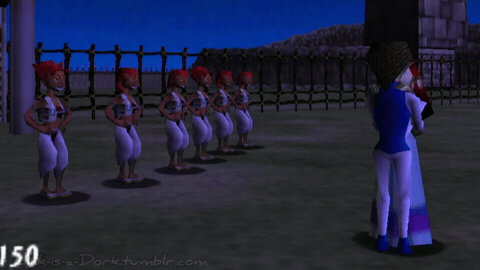
Oh no. TOTK being right around the corner, it might finally be time for the Gerudo Post.
(aka half of the reason why I made a Zelda sideblog in the first place)
So I want to preface all of this by saying that, as you could probably tell already, I’ve always adored the gerudos. They have fascinated my small child brain when I was 7; then the obsession made its comeback when I was 14, and now, here we are, almost 28, and I’m still thinking about the gerudos. I think they might be among my favorite fictional cultures for their potential and their understated storyline. I guess growing up in a very Arabic neighborhood, coupled with being bi-culturally latinx (?? does Brazil count?? you tell me), also always made them feel like home to me –especially when I was very young and there was not a lot of cool female representation flying around that managed to involve fiercely independent PoC women, flaws and teeth included.
This whole weird-essay-thing tries to do two things. First: analyze the place gerudos have occupied in the series, their initial problematisms and their subtextual narrative arc during the Myth Era coupled with their relationship to Ganondorf. Second: tiptoe to Breath of the Wild and poke it with a stick to see what happens –and in doing that, explain why I believe a lot of their characterization was defanged in service of smoothing their past with the hylians instead of deepening the culture on its own terms, and why I’m a little apprehensive about what that might mean for TotK even though I adore seeing the best girls at it again.
Those are the uhh terms of service??
And now, we must go back to 1998.
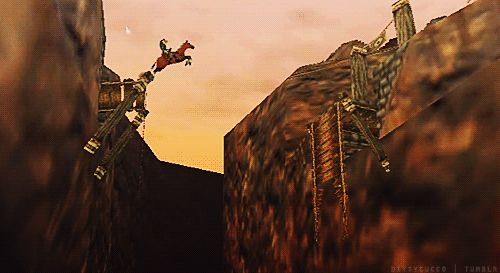
OCARINA OF TIME ERA
There’s so many things about the gerudos that are noteworthy and rich, and they’ve made for a complex piece of Zelda lore ever since their introduction –and when I say complex, I don’t 100% mean it as praise. The very racially charged decisions made about their inclusion have been discussed at length by the fandom, especially when it comes to orientalist and Islamophobic tropes being deployed pretty thoughtlessly in Ocarina of Time (their sigil being literally a crescent moon and star originally, the parallels are pretty obviously there).
We’re talking about a band of amazon-like, big-nosed brown women from the desert ruled by a single Scary Evil Man born once every hundred years hellbent on conquering Hyrule who they apparently worship like a god, characterized primarily as thieves, decked in jewelry and orientalist-inspired harem/belly-dancing clothing, hostile to the white good guys of Hyrule (especially men), unblessed by the Goddesses and so deprived of elongated ears (this is true for OoT –we’ll come back to that), also known as a demon tribe with their deity straight-out described as evil-looking by Navi (on my way to cancel you on twitter Navi you watch out), and secretly led by evil twin witches who can turn into a single seductress and, as two mothers, raised their Scary Evil Guy king who happens to basically be the devil.
In so few words, gerudos are the future that liberals want.

It’s worth notice, also, that Ganondorf’s characterization in this game is… kind of relentlessly uncomfortable to play through, especially before the 7 year skip. The utter assumption of depraved and evil intents from every character surrounded by dialogue that does little to hide its biases in spite of having generally very little proof to back them up –even though, in the game’s context, every character is correct to call his eyes evil and the darkness of his skin a moral judgment in on itself. The scene where Zelda demands that we believe her conclusion that the sole and only brown guy in the entire kingdom is evil and will do harm, and the game straight out refuses to progress until we concede that her dreams are prophetic and that this man must be stopped at any cost even though she has no more proof than her discomfort… hits different on replay.
I’m restating all of this not to pretend I’m making a novel and thought-provoking point, but to bounce back on a tumblr post I saw a while back (that I can’t find anymore!! I’ll link it if I find it again) –and so express what it is that gripped me with the gerudos in spite of their pretty damning depiction… and actually maybe thanks to it.
There’s a surprising amount of texture to Ocarina of Time’s worldbuilding that exists folded within the things introduced and left hanging, or in its subtext –and whether on purpose or not, I believe it is why people keep coming back to this iteration of Hyrule.
What was that about the king of Hyrule unifying a war-torn country? Why did the gerudos break the bridge connecting them to the rest of the kingdom during the 7 year timeskip while still worshiping Ganondorf, and why are the carpenters trying to rebuild it against their apparent wishes? What was that about gerudos imprisoning hylian men trying to force entry into their lands? What was that about the secret death torture chambers right next to the Royal Family’s tomb and connected to the race of people who were, apparently, born to serve them?
Nothing? Oh okay… okay… okay….
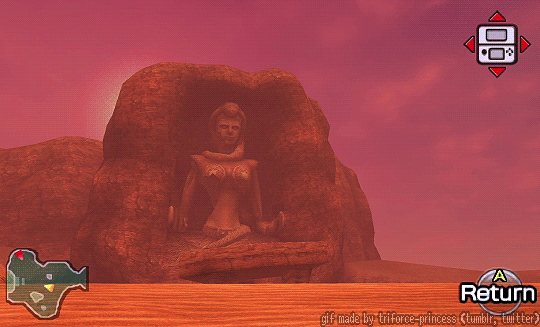
The same can be said about this strange depiction of this hostile tribe, consistently described as wicked yet suddenly friendly once you prove you deserve their respect once you... defeat them, so you now have joined them? Ocarina of Time isn’t very consistent when it comes to characterizing them as their occupation (thieves) or as a proper culture, with a king and a strange system of rulership that seem to involve at least 5 people: Ganondorf, the Twinrova, Nabooru and the unnamed random woman who decides you’re now part of the gerudos because you slashed enough of them with your sword and hookshot, which, uhh ok.
They’re but a ragtag and negligible group when discussed next to gorons and zoras and hylians, but they also clearly have their own religion and at least a 400-hundred years old history (probably far longer than this) and hints of a written language of their own. I’m not sure the game itself knows what it wants them to be, beyond: intimidating and hot and cool, but also wicked and, because of Ganondorf and the way you barge in their forbidden fortress (heh) with the explicit intent to dismantle their king, in apparent need to be saved from themselves.
Speaking of rulership and the Spirit Temple, let’s have a quick tangent about Nabooru: I always found her characterization when meeting with Child Link pretty strange. I refuse to mention the promised reward, which feeds into everything orientalist mentioned above, but I always found her moral compass so extremely convoluted for someone coming from gerudo culture. Nabooru says that, despite being a cool thief herself, she resents Ganondorf for killing people as well as stealing from women and children. Stealing... from women. Nabooru. Why are you this pressed that he steals from women!!! This feels so out of place, that the only girl of that hostile culture that betrays her king and befriends you, is the one that upholds moral values that only a hylian could possibly hold.
Either way: the strange unquestioned contempt of the game for them as a culture, mixed with the occasional bouts of heart, friendliness and badassery, makes it hard not to consider their depiction as pretty biased in favor of the hylians finding them at once exotic, scary and exciting, and could hide a more complex reality you might only get one side of –especially when you know there were originally plans for Ganondorf’s character to be more gray and motivated than what the campy final version ended up being. To be blunt: even in the context of a game for children, and maybe because of that fact, it all reads like a reductionist and imperialist/colonialist reading of a more complex situation.
This might seem like A Lot coming from a game where the actual game writing can be this overall flimsy and simplistic due to the standards of the time (it’s rough, it's so rough). But I would have never dwelt on that thought about a little children’s game if not for the mainline entries that came soon after, because... ooo boy.
The sense you’re not getting the whole story was certainly not helped by the introduction of Wind Waker Ganondorf, and the chilling emptiness of Gerudo Desert in Twilight Princess.
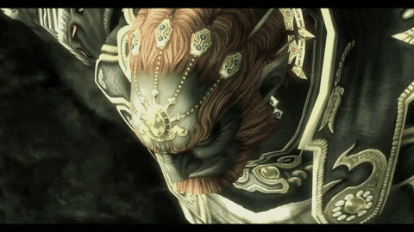
AFTER THE TIMELINE SPLIT
(I’m skipping Majora’s Mask, not because I dislike them in the game or think they’re not worth talking about, but because it’s a parallel universe and they’re never even called gerudos and their reality seems extremely different from their sisters in Hyrule so I think it’s okay to call them tangential and not dive too deep in this particular depiction)
Here’s something I want to highlight about gerudos and how they were characterized before BotW came along: their absence. Not only their physical absence, the lack of any gerudo character that calls themselves gerudo, but their absence from the text itself.
It’s not that Wind Waker and Twilight Princess retroactively scratch them off existence: we can clearly see Nabooru’s stained glass art in WW as well as recognize them being mentioned in Ganondorf’s final boss soliloquy, and WELL there’s quite a lot to say about their imprint over the world of TP. They are there –or at least they... were there. But nobody ever talks about what happened.
In Wind Waker, there was the deluge. It’s assumed lots of people died then, and those who survived scattered across the Great Sea. Are they sealed under the waves? Have they drowned? Is Jolene, Linebeck’s ex-girlfriend in Phantom Hourglass, a distant relative of one of the rare survivors? It’s unclear, beyond the fact that Ganondorf is the only living gerudo we see in this entire branch of the Timeline split.
In Twilight Princess, the desert which bares their name is empty. The hylians never mention that it used to be the name of a tribe: they’re not even named when Ganondorf is introduced for the first time, reduced once again to a mere band of thieves. We learn his plans to steal the Triforce in OoT were foiled, and that he may have turned to war. Then he lost the war, and was executed in Arbiter’s Ground: a strange structure in the desert, a mixture between a temple, a prison and a coliseum. What looks like gerudo writing coexists with hylian symbols, which often look much fresher. This dungeon is the Shadow Temple of TP: a prison hosting the worst criminals the kingdom has ever known, now haunted and cursed. Besides the locations, the only character that vaguely look gerudo in the entire game besides Ganondorf is Telma, a character with pointed ears that never seems to identify as anything but a hylian. What happened? Who’s to say. Nobody ever says anything. Not even Ganondorf bothers to mention them the way he did in WW –and though the game’s story is quite focused on another exiled tribe seeking revenge and dominion over Hyrule as retribution, the parallel is never explicitly drawn. So who’s to say what happened there. Who’s to say.
And in A Link to the Past and the games forward? The only mention of other gerudo characters are Koume and Kotake, resurrecting their son in the Oracles games through their own sacrifice and failing to bring anything back but a monstrosity incapable of making conscious decisions. Granted, most games in that extremely weird Fallen Timeline predate OoT and therefore had yet to make gerudos up at all. Still: canonically, between the gap of OoT and ALLTP, whatever it may be, gerudos disappeared here as well.
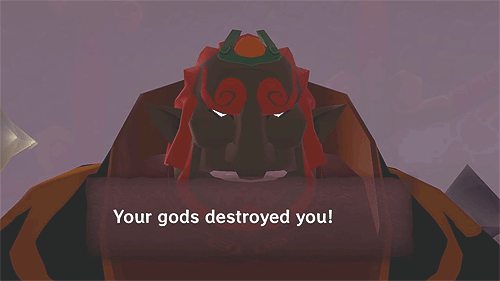
I think there’s something subtle and a little heartbreaking about the fact that no matter what Ganondorf does, the gerudos always end up dying out. His yearning for Hyrule, its gentler wind and the Triforce blessing its lands always costs him the kingdom that he does have already.
Now, does he care? A lot of people would argue that he doesn’t, that he used them like pawns for his own ambition and saw them as servants more-so than sisters, and I wouldn’t be surprised if it was Nintendo’s official opinion, but… One very powerful thing about most of Ganondorf’s incarnations (focusing on the human ones) is that he never seems to reject his cultural heritage. They could have gone for him wearing more kingly hylian stuff given the whole underlying theme of envy and pride surrounding his character, but never once does he try to look more hylian, beyond the ear situation that seems to be tied to the Triforce of Power? Either way: he is gerudo. Several of his outfits reference his mothers, as well as general gerudo patterning and jewelry. His heritage is something he proudly displays, even hundred of years in the future when there is no one left to remember what it means but him. I think it’s a very potent piece of characterization, an arc that crosses over multiple game and says something pretty intense about this character’s fate and his inherent destructiveness over the things he touches –starting with the Triforce, all the way up to his very own body and mind. His mental breakdown by the end of Wind Waker, when the king of Hyrule himself forces him to give up on the thing he sacrificed everything for, takes a new kind of weight with the whole picture taken into account.
(not to excuse genocide or general egomania-fueled madness and violence, but one thing doesn’t mean the other isn’t also relevant)
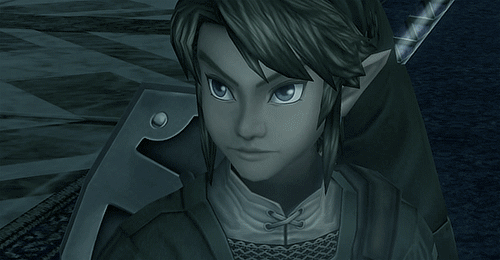
Regardless of whether this is a tragedy for Ganondorf as their uhh complete failure of a king, honestly, it is undeniably a tragedy for the gerudos themselves: a once-in-a-lifetime joyful event turned into a never-ending nightmare from which there seems to be no escape, their legacy now condemned to fade to black, leaving nothing behind but a demon boar forever laying ruin upon the world.
One may say I’m taking on the bleakest explication for the gerudos’ absence when there could be others. It’s true! Perhaps the gerudos are just chilling off-screen, completely fine, not interested in whatever is happening in the kingdom nearby and their disaster child having yet another temper tantrum about not being the Goddesses’ favorite boy. It’s possible! But regardless, what little elements we do possess as players doesn’t seem to support this, even if it remains possible –and regardless of actual gerudo lives, gerudo culture is definitively a goner in every single timeline.
Even if they did survive... Hyrule still won its unification war.
(I won’t mention Skyward Sword as they are not really a thing there, except for a butterfly that seems to suggest the Gerudo Province was a thing before the gerudo people –I don’t know what to do with this honestly– and the whole Groose situation, which, I’m not sure what to make of either beyond the fact that he may have gotten cursed by opposing Demise? And then went on to start the gerudo tribe, which ended up being an all-women group for some reason? Maybe? It’s not confirmed? I feel like it’s more of a fun tidbit than a central piece of the gerudo puzzle, so I’ll leave it there like I would a cool rock I brought back from a walk and that I don’t know where to put in my house)
Then, Breath of the Wild happened and changed things.
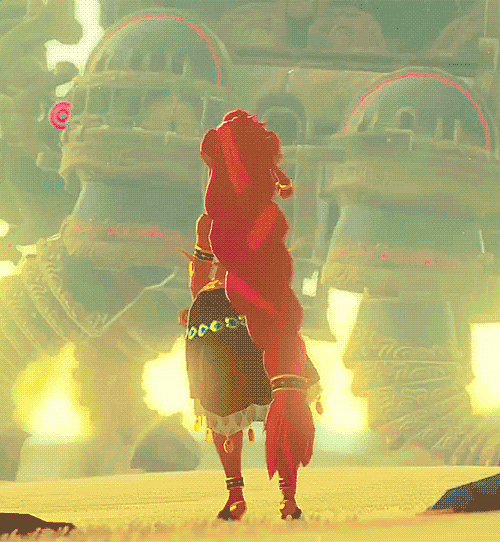
BREATH OF THE WILD
(Additional short note, but: while I won’t mention Four Swords Adventure, since it’s a weird one that almost nobody has played and severely messes with the Timeline, we kind of see the beginnings of what is about to happen in Breath of the Wild in this game –gerudos coming back without much explanation, then distancing themselves from Ganondorf to become friends with hylians because he was too hungry for power and now they are nice and have good reputation because they are our friendsss)
I was actually so happy to learn gerudos were making a comeback in a mainline Zelda game, and this got me more excited about Breath of the Wild than basically anything else the game involved. And getting to explore the Desert once again, meeting this new batch of impossibly tall buff girls, getting more about their language and their culture, Riju and the rest of the little girls are adorable, the grandmas are so cool, the sand seals??? sign me the fuck up??? And above it all, hanging around Gerudo Town at night and feeling as warm and cozy as little me liked to imagine how freeing it would feel, to stay there and watch the desert behind the safety of their walls in OoT… This was great. I loved it.
It was a huge compensation for the criticism I’m about to make, but did leave me with… questions regarding how their culture was going to be handled moving forward.
I’ll start with something small yet deeply revelatory, then work my way from there.
So... gerudos’ ears are pointy now.
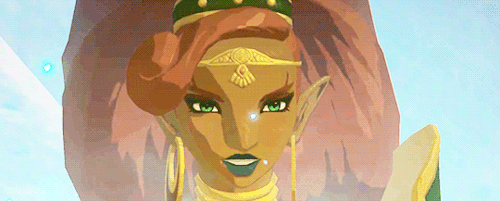
This is pretty significant. Lore-wise, it’s been said that the elongated ears of hylians are there so they can better hear the voices of the gods. It’s considered a sign of holiness in-universe. There's a bunch of really thoughtful analysis on tumblr over that whole Ganondorf ear situation, which is a mess but also very interesting, but the short answer is: I think the absence of pointy ears was a clear design choice to originally signify them as Less Good. Even when Ganondorf gets pointier ears, they never get as long as hylians’. Worth noting: not every non-gerudo character has pointy ears: gorons, zoras and ritos (among others) do not possess this trait, and there are even some humans that have regular rounded ears in the series –though they always seem to be of lesser relevance, if not downright peasants in Twilight Princess. Pointy ears always tended to implied a strict hierarchy in the series: basically, the more pointy, the more Protagonist you become.
(also their eyes becoming green instead of the traditional yellow/golden, which looks more wicked and demonic --and cooler also tbh)
The pointy ears imply two things. From within the game, this could be interpreted in two ways: either that gerudos… converted, for a lack of a better term, and are now considered holy through their worship of the Golden Goddesses and/or Hylia, or that their mingling with hylians through tens of thousands of years had them acquiring this trait out of sheer genetic override (though they have kept their mostly-women birth rates, their big nose, darker skin –for the most part– and red hair). Probably a healthy mixture of both. Design-wise, it signifies something quite simple to the player: they are on hylians’ side now. They are good guys. We can trust them, even if they still have a little spice in them. They aligned themselves with us and against Ganon in all of its manifestations (even if he’s but an angry ghastly pig being parasitic to everything it touches in this iteration). They are on the side of Good, definitively, and will fight evil by our side.
On that note, I think it’s worth bringing out another major change from their initial iteration, which is their overt friendship with Hyrule as a whole, and with the Royal Family in particular. Despite not allowing any voe inside their walls (we’ll come back to this), their relationship with hylians is pretty neat. They have booming trade roads, travel and meet with the rest of the cultures, and are fierce enemies with the Yiga clan, who are renowned for being huge Calamity Ganon supporters. The tables certainly have turned. I want to bring out, in particular, Urbosa’s friendship with the queen and her role as the cool aunt taking care of Zelda and protecting her from evil (to be noted: I am not familiar with Age of Calamity so if I’m mischaracterizing her in any way, please let me know). The gerudo sense of sisterhood has been extended to the royals they used to fight against. I would go on and say the cultures peacefully coexist, but I think that what we’re looking at here is a case of vassal behavior, just like we used to have from zoras (in the non-Fallen Timelines) and gorons. This is a huge departure from gerudos being openly rejecting of Hylian culture in their initial iteration, and something that is worth returning to later.

Okay. Now it’s time to mention the weird obsession BotW gerudos have with romance. I didn’t take notice of my issues with their writing until I realized how prevalent of a theme that was. Now, the reason given for gerudos to refuse entry to males (of every race) has much more to do with preventing young gerudos to make mistakes than anything else, and is actively being put into question by the younger generations –which would make sense. But the amount of NPCs that either lament their lack of match, talk about their husbands (because they marry now apparently) or are invested in romance, and a very limited understanding of romance at that (heterosexual, closed, etc), makes for much more of the population that I initially expected. There’s no mention of what’s going on with their males, if there are new males being born and either exiled or abandoned, or if Ganondorf being technically still alive have have cut them off male heirs. Either way: no more kings, only girlbosses chiefs.
To have the gerudos so interconnected with Hyrule, not only through trade but through extremely coded romance where they have to make themselves palatable to a future male partner and enforce fidelity, was… a choice. The extremely brief and skippable mention of gerudos sometimes going to Castle Town in search for boyfriends in OoT became half of their personality traits in this game. We went from a race that was fiercely independent and mocking of the unworthy men who tried to mingle with them, to… this. Now I’m not saying some of the sidequests aren’t cute, or that I didn’t like the wedding, or that the grandma near the abandoned statue of Hylia (so she was worshipped at some point) clocking us and talking about her love life wasn’t one of my favorite gerudo conversations. I’m saying that the vibes have definitively changed. For the better? I’m not sure.
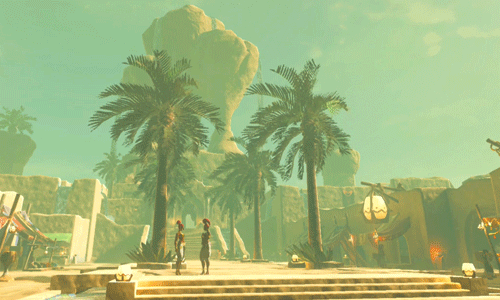
I once stumbled upon an article that said that Breath of the Wild gerudos were a huge improvement compared to their original introduction, because they were no longer presented as evil and hostile thieves groveling at the boot of a single man, but as a full culture allied with the protagonist and actively involved in the story, while still getting their Cool Girl Badass moment (again can’t find it anymore, I’ll link it if I stumble upon it again). I see where this comes from, but I honestly can’t help but consider it a reading that assumes something pretty major (though through no fault of their own, as the games tend to hammer this down as hard as they can), and that being hylians as the unquestioned anchor of Good.
Which, in spite of what the games want me to believe, I… feel uncomfortable taking at face value.
To me, regarding how gerudos are being incorporated in that goodie narrative, this is kind of a case of surface-level feminism trumping over colonialist/imperialist concerns. It becomes more important to perform the aesthetics of being cool and friendly and independent than scratching at any deeper problem that would risk making people uncomfortable. This is kind of Green Skin Ganon all over again: oh wait, isn’t it a little icky to have the evil bad guy being brown while faced by the most aryan-looking ass heroes of all time? Okay, then let’s take the brown guy and make his skin green so we don’t have to feel bad anymore that the conflict has racial undertones!! Solved!! There’s nothing questionable about changing a PoC's features to make it more monstrous and less human, right?
To me, it’s kind of the coward option: instead of accepting the messy reality those initial choices created (and their interesting nuances if taken at face value), let’s just… rewrite the PoC culture’s history to make it feel less uncomfortable for the white heroes. In many ways, it is an extension of what hylians have always done: scrubbing the weird and messy things about the past and shoving them deep down into the spooky well and far into the desert prison and away in alternate hellish dimensions, and then make up a very simple story where they get to feel good about themselves –except this time, it’s the fabric of the games, the literal reality, bending backward to make it happen. Which, in my opinion, makes it much worse than before. Now, there’s no conversation. The fabric of reality is changing their own history so that there is nothing to discuss anymore. Ganondorf was always evil incarnate. He never had any point. It was always 100% his own fault, his own hubris, his own fated wickedness. He was always demonic (and green, very important –having a flashback to people on twitter accusing artists restoring the TotK green skin to the original brown of wanting to make Ganondorf black, and like….. how do I put it gently…..)
And, above all else: gerudo are to distance themselves from his legacy so they can stay in the club of the Good and Just and Holy.
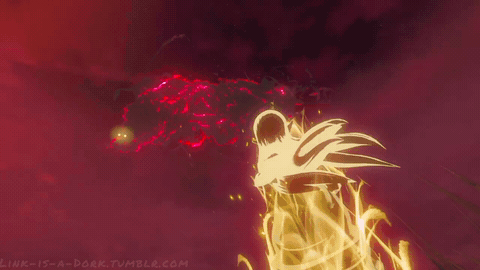
Because here’s the messy thing: as much as I love seeing the gerudos again in Breath of the Wild and as much I love for them to have survived the Era of Myth (??? somehow ???), this… kind of changes Ganondorf’s character arc. No longer do we have the story of a king who wanted more, either for his people, for himself or both, and led his culture to its destruction in his search for absolute Power, while remaining ironically incapable of maintaining what little he already had. This starts from him kneeling to the king of Hyrule in OoT and leads to the deluge, Arbiter’s Ground, his own mothers dying for the sake of his failed resurrection. Breath of the Wild changes this: now, the gerudo were apparently fine without him? They apparently did their own thing and became suddenly and inexplicably disconnected from his actions? I know it’s kind of implied they side with hylians at the end of OoT, but it’s honestly never really explored why they would cheer for the death of their king while never seeming to resent him before except for Nabooru –there are mentions of brainwashing for those who resist him (as well as “other groups in the desert”, tho they are never mentioned again), but it’s hardly a proper plot point for the majority of the tribe, aaaand they still die by Wind Waker in the Adult Timeline, in spite of their potential alliegance…
(again, this shift towards submitting to Hyrule actually started with Four Swords Adventure, getting crisper with each iteration)
There used to be this polite blur regarding Ganondorf’s relationship to them, how much he used them and how much he acted in their name (with arguments for both sides), and I think this messy and debatable question mark was one of the most compelling aspects of his character. Gerudos rejecting their relationship at a near-cosmic, reality-bending level, removes a huge layer of complexity to both parties… all for the benefit of making hylians come out cleaner out of this whole exchange, their moral grayness barely a whisper in the distance.
I’ll kind of go on the record and say that I suspect the addition of Demise to the canon to serve a similar purpose (at least in part): if Ganondorf becomes but the manifestation of a demonic curse, and is no longer an extremely messy character brimming with agency and drive, forcing the heavens to reckon with said agency in a way he was never meant to access, born from a complex set of circumstances from which we clearly get only a limited and biased perspective, then it becomes extremely clear that he’s a Bad in a way that isn’t worth exploring further. Even if he does have some points, he is a Bad. It’s what matters most. Not to say I even hate what this angle can bring to the table or that I want him to become Good (I don’t –I’ll talk more about why I dislike most takes on him being a helpless victim to the curse), but once again, who benefits from adding another Unquestionned Baddie to the equation to rest upon? Not him, and not the gerudos, that’s for sure.
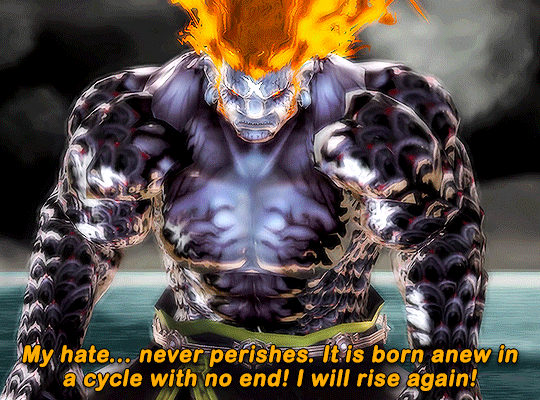
So. Why did I, me, personally, like the gerudos in the first place?
Beyond the inherent coolness factor of their culture and the fascinating mysteries of what is merely suggested, I think… I think I loved gerudos because we were obvious outsiders. Because their rejection of Hylian culture was so sharp and extreme, their value system so different, and their writing, their religion, their relationship to power and hierarchy and worth wanted nothing to do with hylians. They didn’t need hylians, beyond them having potential resources to steal. In fact, the threat of hylians influencing their culture was such that the entry to the Fortress was forbidden to everyone (I don’t think men were ever singled out, by the way, even though they are mocked relentlessly). I think there was something inherently hopeful about this semi-matriarchy resisting the outside world, and especially its notions of what girls were meant to be –it was 1998, and every other girl character in OoT, besides Impa and Sheik that?? is another can of worms entirely, is either helpless or someone to save. For them to reject this narrow vision of femininity was, in my opinion, much more radical than what we got in BotW. Less nuanced, more problematic perhaps? But also much more powerful. Gerudo Valley is home, not to a town, but a Fortress.
Hylians were worth being resisted.
In Breath of the Wild, their refusal to let men enter their town is kind of boiled down to a fading tradition over-focused on romance, a meek little game of chase. Their entire goal seems to be finding a hylian to settle down with. Say what you will about the single man and the many girls (never explored and completely open-ended in its implications, btw), but at least it wasn’t… that. At least it opened the way for different ways for people to exist and imagine culture and civilization, outside of the heterosexual couple, the christian-infused patriarchy and its trickling down implications. What I want to say is: let my girls tell hylians they ain’t shit!! That they aren’t the end all be all of reality! This is what made gerudos so compelling in the first place! Where is that bite now? Where is that self-definition?
It’s gone, because hylians need to be Good. So we tee-hee at the creep running laps around the town, we disguise ourselves to breach their trust and infiltrate their town (though there is nuance to be had there, gender be complicated etc), we watch them pine after shitty dudes and take classes to become the perfect approachable woman and make love soups with ?? strange ingredients honestly, and we witness them get very friendly with the Royal Family they used to conspire against, dying to protect the princess against the manifestation of their ancient king reduced to a raving puddle of Bad Boar.
Hyrule, unified against him.
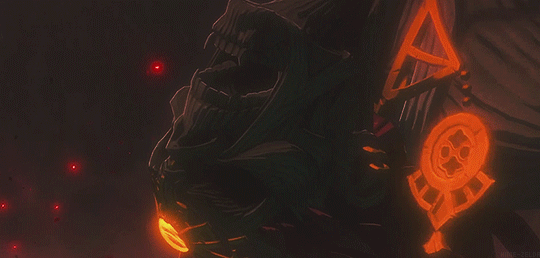
TEARS OF THE KINGDOM
For posterity’s sake: this post was made before the game was released. I’ll probably update my thoughts on a separate thing later on.
I don’t think gerudos allying with the hylians and burying their own legends about Ganondorf as deeply underground as they can until it blows up in their face is a bad setup at all. It’s actually pretty juicy, and there’s a ton of fascinating stuff that could happen here –even some involving gerudos taking a firm stand against him while still reconnecting with their past and the choices they made once. This is my hope with the title of the game: Tears of the Kingdoms. Let’s examine them all, account for the damage, and decide how we move forward from there with the full knowledge of where we come from.
What I am afraid of (and I already made posts about that) is the scenario where gerudos rallying against Ganondorf, which I expect will forcefully try to take back his place as their king, is used for cheap feminist points that completely fail to examine, well. Everything mentioned above. Where reality bends itself out of the way of the Goddesses, and hylians’ responsibility in any of this mess, so that everything bad is 100% Ganon’s fault and so he must be cast aside and torn away from the Cool Gerudo Girls and this is 100% justified and deserved because we are Independent Women Who Take No Shit from No Men (unless they are the king of Hyrule or any random hylian they wish to marry apparently).
I’ll say this here because it’s been burning my mouth every time I see discourse about Ganondorf and the gerudo: gerudos declared him as their king. To make a really bad comparison that I dislike: he didn’t run around to assemble girls and make a cult around himself, he was born with the cult already formed around him (and it’s not a cult, it’s just a different mode of governance –hylians also revere the Royal Family like gods, don’t they?). This heavily changes the dynamics at play. Not to remove any agency from him to do a little invasion about it, but chances are the ancestors to BotW’s gerudos fully expected him to behave in this way, at least to a degree –in OoT you see very plainly that they value physical prowess, feats of thievery, witchcraft and general violence. It’s more complicated than him being a Bad and making the poor helpless women go along with the plan uwu –even taking the brainwashing into account, AND Koume and Kotake counting as gerudos too, even if they might not be not fully innocent in shaping the culture and the man himself. If manipulation and forced servitude is the explanation given, I’ll be genuinely mad –because, once more, all the nuance and messiness would be flattened for the sake of making Ganondorf Bad and the gerudo Good (= on hylians’ side).
It bears to be said: I think feminism stances that require, not to criticize (which is fair), but to fully dehumanize and bestialize men of color to make any sense are uhhh bad, and it's worth questionning who they end up serving in the end.
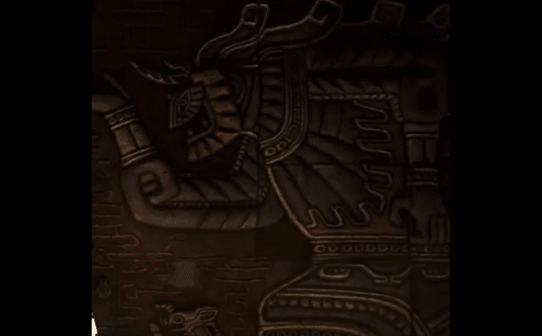
The flip side of this would be to make Ganondorf a poor little meow meow that was secretly controlled by the evil Demise all along, and... I’ll be real. I really don’t think it solves our problem at all. It might even make it worse.
My problem with how gerudos have been handled thus far, being mostly connected to how they behave in relation to hylians Good, is that they’ve been systematically defanged not to threaten the status quo as much as they used to. I think it’s pretty clear why I’m not a fan of Ganondorf being a mere victim of cosmic circumstances; I have a post that goes more in depth about this, but to simplify: my man has legitimate grievances. To make him a mere puppet to Evil Incarnate would, to me, be just another attempt to erase the despotism of the Goddesses, the unjust hierarchy of the world, what hylians have historically done to the races they were in conflict with (looking at the Yiga for the most recent example…)
I’m not saying his fight is clean or even legitimate, that he isn't driven by his own sense of self-importance above anything else, or that he should win (he has no plan beyond domination and victory, that's not a future). But I think there’s something really important about having someone being willing to fully consume himself and everything around him for the simple fact that someone should resist the order of the world. Even if that makes him a heartless, cruel, and egomaniac demon-pig. Even if there’s no Hyrule left to rule. Even if his own people despise him, or are long gone and forgotten.
Is it a little heart-wrenching? Uhh yes to me yes most definitively. This is why Wind Waker Ganondorf hits so hard, and remains (I think) his favorite entry in the series so far. But… I still find this fate of eternal resistance more resonant and empowered, and far less grim, than if Hyrule’s lore absorbs his hatred and rage, gives it to another entity that would be Badder (= more opposed to hylians and the goddesses), and scrubs it off anything icky and uncomfortable, rendering it completely domesticated and non-threatening to hylian domination; rubbed of his skin color, of his complexity, of his own emotions, even made... kind of sexy now, in the same way his sisters have been made before him? I am very, very afraid of him being turned from furious and an unapologetic subject in his own legend to a "redeemed" (according to whom??) and palatable object in somebody else’s, that you now end up having to… save from himself.
Again, I want to trust that Tears of the Kingdom can walk that line and preserve everything sharp and contrasting and profound and thrilling about this fascinating setup. I don’t expect a philosophy course, this is a game for children –but it doesn’t mean Nintendo didn’t do an astounding job with similar setups in the past. Again, I’ll invoke the Wind Waker conflict, but Twilight Princess did a lot of great things as well (Zant’s speech, if you can get past the weird stretches and stumping and NNHYAAAs, is pretty fantastic) –and the subtle writing of Majora’s Mask is also proof enough this series can be complex without being impermeable.
So this is where my hope lies. Not really with BotW’s writing, which, I’m sorry to say, but I found to be below what the series has done in the past (I have no problem with the setup and how the story is explored, I think it was a great idea, but wasn’t ever sold on the actual writing the way I may have been with previous titles –it felt… very tropey to me overall, with a couple of highlights). But Nintendo has shown to know how to write compelling stories for children that know where to sprinkle its darkness and how to preserve its hope, and this is this side I’m relying on for this delicate storyline moving forward.
And now? Now… I suppose we wait and see.
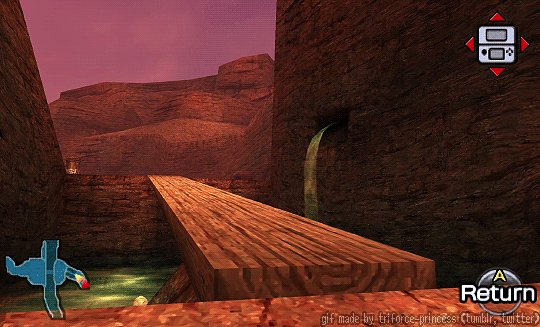
(thank you for reading my impossibly long essay what the actual hell, at least I got it all out of my system, see you in part 2 for when TotK comes out I suppose aaa)
#gerudos#gerudo#ganondorf#tloz#totk#botw#breath of the wild#ocarina of time#twilight princess#wind waker#ww#tp#meta#hylian critical#zelda meta#thoughts#this took SO LONG#but at least it's DONE#let me know if I say stupid things!!#I probably do!!
884 notes
·
View notes
Note
When you really think about it, Chloe is just a version of Azula written by people who failed to understand what made Azula work as a character.
They are both malicious 14 year old girls that have a final swan song where they fight the heros for the last time and have a breakdown when they lose. They both have neglectful mothers (but like at complete opposites of the neglect spectrum) that they crave love from, and they both have "loving" fathers that shaped them into the horrible people that they are today.
However, the writers of ATLA understood that Azula is the way she is because of her circumstances; if her father wasn't abusive fire Hitler that encouraged the worst parts of Azula's personality, and if Ursa was able to have a better relationship with her daughter, then Azula would not have turned out the way she did.
Meanwhile, the writers of ML honestly think that Chloe is a bad person only because of her choices, despite writing the exact opposite. Chloe got her ideals of Rich superiority from her Father who raised her alone for most of her life, who is also shown to constantly abusing his political power in the early seasons, but the show dosen't point out that obvious connection beyond "he dosen't punish Chloe enough because he loves her too much UwU". Chloe's mother straight up dosen't care about Chloe and acts like a meaner version of her, but Chloe is the one the Narrative treats as the big threat that needs to be stopped? Andre gets rewarded with a new daughter despite being the reason why the old one turned out so bad??
Azula and Chloe are both cogs in the evil machine that realize they are unloved at the end of their stories, but while ATLA puts the blame on the machine, ML puts the blame on the cog and it's really weird because they laid the ground work for the evil machine!
Also, Zoe is like a dollar store version of Zuko I guess.
Here's another thing that made Azula work: Her progression as a villain felt more natural.
During Season 3 of Avatar: The Last Airbender, the show acknowledged how screwed up she was mentally. After losing Zuko, Mai, and Ty Lee and being made Fire Lord only for her father to crown himself Phoenix King, Azula's sanity gradually degraded, and it was played seriously. It was clear that as evil as she was, she has a lot of issues that make it hard to just write her off as beyond saving.
With Chloe, after the betrayal, the writers ramped up her evil moments while acting like she's always been this cruel. While you could argue these have been traits she's had since Season 1, there's no natural progression to her getting worse after she betrayed Ladybug.
#immaturity of thomas astruc#iota#miraculous ladybug#miraculous ladybug salt#chloe bourgeois#queen bee#queen b#not miraculous ladybug#avatar the last airbender
192 notes
·
View notes
Text
So Pixlriffs’ finale is a masterpiece and I’m experiencing a lot of emotions right now ✨🌻✨
For my own reference I made a transcript of the monologue and thought I might as well share it! It's under the cut to avoid spoilers but the whole first 8ish minutes of his video are typed out. I recommend watching at least that much, if you haven’t yet, because it’s really something worth hearing.
We are not done.
Not yet.
Our stories do not begin here, and neither do they end. But before they fade into obscurity, as so many events do, there is one more story left to be told.
[It is the Story
of
the World.]
It’s important to remind ourselves that history is an account of events remembered—and there are so few left who remember, so it mingles with myth and hearsay, folklore and fireside stories. This is the account of just one man, and others may recall the tale differently. Others still may decide to change the narrative to suit their own ends. And this, it must be said, is no bad thing. So it goes.
[Sun setting
over
our Creation.]
—
In a long-lost age before records truly began, our world was built by Titans (or so it is said). The lands they created became home to people who would seek to emulate and even to surpass that act of creation, and that would eventually bring about their destruction. But destruction is simply part of a cycle. Nothing is ever truly lost.
Those who foresaw the destruction fled before it could bring the walls of their homes down around them. And many who had been downtrodden and overlooked saw it as their chance to find a new life for themselves.
Thus began a great migration, leaving behind the old nations of the world and striking out for somewhere new, a life untethered from the follies of their former state. And though the road was long and treacherous, and many fell behind in the wake of such an awful endeavour, new bonds were forged in the fires of adversity.
As time passed, and more joined the great caravan, the host became a nation of its own, a glorious congregation sharing one purpose, singing the same resolute song. Though the road was long, they were homeward bound.
And a home they found nestled in a mountainous landscape, one that might have been carved by the very bones of the gods themselves. There they planted roots, drank deep from the water, and continued to grow. The farmers sowed new fields and raised new flocks. The work of many hands turned to building a new city. And together the architects conceived a castle upon a great plateau that would stand as a monument to their past apart and their future together. To them, the castle itself would tell the Story of the World.
Stone-whisperers from Mythland and the Grimlands, well-versed in masonry of all kinds, sculpted its walls from the abundant rock of the nearby mountains quarried for the glory of their new capital. They wrought rock and iron, carved and timbered their great halls, and raised mighty towers to stand atop the grand cliff.
The mages of the Crystal Cliffs brought knowledge of magic and the beauty of gemstones, and theirs was the sanctum at the heart of the castle, ever-seated at the Ruler’s left hand: their shield and protector.
A tribute was raised to Gilded Helianthia, whose ruler was still revered in the hearts and minds of many, and in time she became their warden against the spectres of the past, carrying the twin burdens of light and shadow on her shoulders; a burden with which the people of Rivendell were all too familiar.
And below, far below, the engineers of Pixandria sought to reproduce the jewel of their empire. A mechanism that would surpass the work of the Copper King himself.
Not all who came to found the Ancient Capital remained for long. Like dandelion seeds, the people of the Overgrown were scattered on the wind, alighting on the mountaintops and valleys. The vast majority of them came to settle in the rolling meadows of Chromia, which was renowned for the richness and beauty of its dyes for lifetimes after.
In the absence of their king, the nation of Mezelea resettled in new badlands, establishing laws and ordinances of their own. Many of them had been armour stands before the king imbued them with life, and some found this a hard habit to shake.
The people of the Cod and Ocean empires, bereft of the waters that gave them life, took to diving in the rocky pools of vast caverns and their affinity for stone grew. Over many generations they adapted, becoming the green-skinned race that folk came to know as goblins—their pointed ears the only remaining vestige of the fins they had once had.
For the gnomes of the Undergrove, this was a homecoming! They had long dwelled here before their exodus through the Nether and the fairy circles of the Evermoore welcomed them with open arms.
And the villagers of the Lost Empire, hiding in plain sight amongst the caravan of peoples, sought to find a place where they would be unburdened by this facade of humanity, standing at last on their own two feet.
But the boundaries of this land were ever-changing, and the nations soon found the cataclysm they had left behind had weakened the walls between their world and others. Waters rose and fell unpredictably; incursions from other realms were possible, bringing chaos in their wake. The tide of history churned and rippled.
None now remember how the Capital fell, only that its remains have lasted: an epitaph to all they had achieved together.
And just like before, new nations would arise. The pirates of Eversea ruled the waters from their secret cove. The inventors of Cogsmeade arrived sailing in from the air on their skyships—only to find whole buildings floating in the golden kingdom of Stratos. Rumours abounded of a Sanctuary hidden in the deepest jungle for those who knew the way.
Their tales are better told by those who knew them well. Our stories do not begin here, and neither do they end. But for this tired historian, it is perhaps best to leave these things in the past and begin to look towards the future.
For whatever comes next, we who have sown the seeds can only hope for a bountiful harvest.
#empires smp#pixlriffs#empires spoilers#empiresblr#empires s2#empires pixlriffs#transcript#CHILLS. ACTUAL CHILLS.#this set fireworks off my brain btw. I want to make all the things right now#im busy at the moment but I will make things! I will! I must!
461 notes
·
View notes
Text

Demo: TBA
Guinevere is a text-based interactive fiction that draws inspiration from the rich tapestry of Arthurian Legends.
You will play as Guinevere and witness the journey toward gaining power and the struggles to keep your reign secure in a kingdom filled with political intrigue and external threats.
In the future, I plan to make Guinevere gender-selectable, and also make Arthur the opposite gender of the MC. However, for the time being, I would like to keep the story as it is until I can better determine the direction in which the narrative is heading.

For many years, people believed that dragons were untamable creatures until one man proved them all wrong. Armed with a mighty sword and a formidable dragon by his side, Arthur set out with his army to conquer all of Britain and bring it under his rule. Unfortunately, your kingdom has found itself standing in the way of Arthur's quest for a united Britain.

Choose Guinevere's gender (Soon!)
Customize your MC’s physical appearance.
Make tough and important decisions that affect you and everyone around you.
Four romances that the story heavily focuses on.
Have a dragon by your side and fight Arthur in the skies!
Form a family.
The fate of the realm rests on a knife's edge - it can either flourish under your leadership or crumble to its ultimate demise.

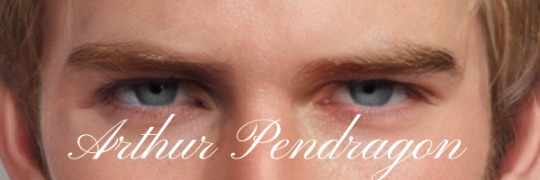
"To achieve the greater good, one must first attain the power to make it a reality."
Arthur Pendragon: King of Camelot and the founder of the Round Table Order.
He is a man of few words, with a cold and aloof demeanor that can make him seem unapproachable. He prefers to keep to himself and often retreats into his own world. Despite his reserved nature, he is a strong leader who inspires loyalty and devotion in those around him.
His golden blonde hair and piercing grey eyes add to his air of regal authority and make him a striking figure. Though he may seem distant at times, he has a deep sense of honor and duty, and will stop at nothing to protect his people and his kingdom.
Will you be able to crack his armor and discover what hides beneath?
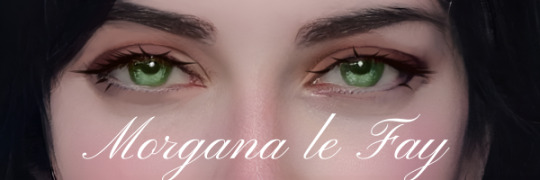
"Your ignorance is truly awe-inspiring. I can only hope to one day reach your level of blissful unawareness."
Morgana Le Fay: She is a mysterious and intriguing woman, known for her use of sarcasm to keep others at bay. Her sharp wit and biting comments often serve as a shield, protecting her from anyone getting too close.
Despite her sarcastic demeanor, Morgana is an intelligent and perceptive individual. She has a keen sense of observation and is quick to pick up on the nuances of the people around her. Her green eyes are piercing and seem to see right through anyone who tries to deceive her.
Morgana's inky black hair is often styled in loose waves that frame her pale skin. She has an ethereal beauty that can be both captivating and intimidating. Her presence commands attention, and it's clear that she is not someone to be trifled with.
She's been hurt in the past and is hesitant to let anyone get too close to her. But for those who are willing to take the time to get to know her, Morgana can be a true and loyal friend or even something more.

"When the going gets tough, the tough get going. I don't know what that means, but I, Sir Lancelot du Lac, never back down from a challenge."
Sir Lancelot du Lac: A knight is known for his charm, boldness, and impulsive nature. He has a reputation for being a ladies' man, with many admirers who swoon at his feet. Standing tall with a strong build and chiseled jaw, he is a man who commands attention wherever he goes. His dark brown hair and deep blue eyes add to his allure, making him a true heartthrob among the ladies.
Sir Lancelot is a skilled and dedicated knight who takes his duties seriously. He is fiercely loyal to his king and the Round Table and will stop at nothing to protect the people he cares about. His impulsive nature can sometimes get him into trouble, but his quick thinking and bravery always manage to save the day. His bravery and courage have earned him respect among many.
Before meeting you, he never found duty to be burdensome. Now he feels it weight more pressing every day.
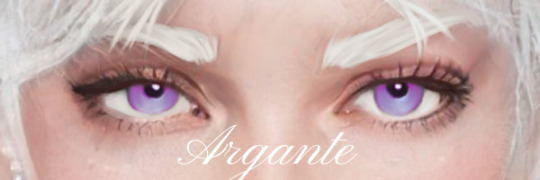
"I hate you with every fiber of my being, but I can't seem to shake the strange pull you have on me."
Hey, just so you know, you could totally have a poly thing with both her and Arthur. Just throwing it out there. 🙈
Argante: Merlin's daughter and Arthur's childhood friend.
Argante is a complex and intriguing woman, born of the union between a fae and a half-human, she possesses unique abilities that she often uses to aid Arthur on his various journeys and battles. Her loyalty to Arthur is unwavering, and she is always ready to lend her formidable powers to his cause.
Despite her fierce loyalty, Argante can be possessive and quick to anger. Her emotions often run high, and she is not one to back down from a challenge. The complete opposite of her father, Merlin.
Argante's appearance is just as striking as her personality. Her snowy white hair and purple eyes create an otherworldly picture, the very air shimmering around her presence adding to the mirage. It's no wonder that many are drawn to her, be it out of fear or admiration.
Argante despises you with a fiery passion that burns deep through her every time she catches a glimpse of your face. In her eyes, you are the thief who stole the man of her dreams - the one she had loved for years.
And yet… there is another side to her that sometimes emerges whenever she catches glimpses of you. This side of her seems to yearn for your attention and affection, creating a peculiar dichotomy that is difficult to comprehend.
If you could somehow break through the wall of anger and resentment that Argante has built, and show her that you are not the enemy, there might be a chance to win her over. You might even be able to establish a relationship with both her and Arthur.
#guinevere#interactive fiction#interactive novel#choice of games#choicescript#dashingdon#hosted games#if: intro#if game#cyoa#masterpost#hg#cog
479 notes
·
View notes
Text
After years of reading Greek mythology adaptations, watching Greek mythology adaptations, listening to Greek mythology adaptations, and making my own Greek mythology adaptations, I've decided that there are two ways in which I will accept Hades as a villain.
The first is the way Hadestown handles him---yes, he's sympathetic and shown to care for his wife, which is a point, but they don't go the stereotypical route of "oh, Hades is the ruler of the afterlife, which is called the 'Underworld' and must therefore be hell? Definitely an evil goth boy, death gods are always evil because death is scary." No, they recognize the fact that Hades is the god of wealth, and use an incredible allegory of capitalism and industrialization that is of course at odds with his wife's solarpunk nature and her constant refrain of "it ain't right and it ain't natural" at her husband's practices. Stories where capitalism is the villain are always some of my favorites, and Hades does admittedly slide perfectly into that role as the god of riches... who just so happens to have dominion over souls.
And the second is one that I don't believe I've really ever seen, but is so, so, so fucking compelling to me, and it's Hades going the "you want a villain, I'll show you a villain" route---something that would fit in perfectly with a modern adaptation.
It would be so damn fun to see a Hades who has been constantly vilified through no fault of his own, either by Zeus or the narrative shifting as culture has shifted, seeing his image change from the passive and fair king of the afterlife who loved his wife and treated her as an equal to the cruel king of hell who keeps his wife captive and rules his domain with an iron fist. Hades, who was already the black sheep when his stories were first being told, and who now has to hear that he's the evil god while his misogynistic brothers are getting off scott-free and are barely even blamed for their rampant infidelity. Hades, who never did anything wrong other than take his brother's horrible advice once and always tried to be hardworking, fair, patient, and understanding. Hades, who had suffered the longest at his father's hand and likely would have taken the throne had Kronos not been a fucking monster, and yet had to watch as Zeus, who'd avoided all of the trauma and had been doted on and treated like a perfect prince his entire life, ended up getting all the glory and reward while not even letting Hades have the dignity of being an Olympian...
After thousands of years of that, it wouldn't take long for Hades to snap.
And I would adore to see a story where Hades claims the role of the villain out of trauma and bitterness and anger, and for it to culminate in a third-act breakdown where he realizes he's lost sight of himself but for him to still get the catharsis of letting it all out
#i have. a lot of feelings about hades okay#he's been my favorite god since elementary school and even THEN i bought into the “hades is evil” narrative#he should be allowed to go the ballister blackheart route. as a treat#hadestown#kinda#hades greek mythology#greek mythology retelling#greek mythology
132 notes
·
View notes
Text
The Reluctant Ruler Trope: A Philosophical Inquiry into Unwanted Power, Responsibility, and the Burden of Leadership

WC: 3,489
Index
Introduction
The Reluctant Ruler in Literature and Folklore
The Existential Dilemma of Unwanted Authority
Political Implications and the Burden of Responsibility
A Special Case or a Universal Relatability?
Closing Words
Introduction
“The world is something that was put into your hands and that you must deal with - so you will. You have a rigid back and steady hands, either metaphorically or physically. Is it nature or nurture? You don't know. You are tired of being steady. You dream of feeling alive. Not that you aren’t, but, sometimes, it’s hard to remember that there is a heart between your ribs.” —“Are You A Soldier, Poet, or A King?” quiz by @atlanticsea
Does anyone here remember the “Soldier, Poet, King” quiz that went around about a year or so ago? When I initially took it, I expected “Poet;” you can imagine my surprise when the “King” result absolutely obliterated my mental health.
As I’ve found, a common theme in my writing is the Reluctant Ruler trope, where either 1) a character is thrust into the role of a savior, hero, or king/queen despite not having any wish to lead people or 2) a character assumes the role of a leader without the full understanding of the morally corrupting demands of the job.
The narrative trope of the Reluctant Ruler has long captivated the human imagination, resonating across cultures and epochs. From mythical tales of kings and queens reluctant to ascend the throne to contemporary narratives of reluctant heroes and leaders, this archetype speaks to fundamental questions about the nature of power, responsibility, and the human condition. But what makes this trope such a tragic and believable character? How do we, as an audience, end up relating to and debating the conflicts and moral dilemmas that these characters face? Today, we embark on a philosophical inquiry into the Reluctant Ruler trope, aiming to uncover its deeper meanings and implications within existential and political philosophical discourse.
The Reluctant Ruler in Literature and Folklore
The archetype of the reluctant ruler is deeply embedded in the narratives of literature and folklore, transcending cultural and historical boundaries. Across diverse traditions, tales abound of individuals thrust into positions of leadership against their will, grappling with the weight of power and the burdens of governance.
Shakespeare’s “Hamlet:” One of the most iconic depictions of the Reluctant Ruler can be found in William Shakespeare's timeless tragedy, “Hamlet.” Prince Hamlet, the melancholic protagonist, is suddenly confronted with the task of avenging his father’s murder and assuming the throne of Denmark. Despite being heir to the throne, Hamlet is plagued by doubt, indecision, and existential angst. His famous soliloquy, “To be, or not to be,” encapsulates the profound existential crisis he faces, torn between the demands of duty and the desire for personal authenticity. Hamlet’s reluctance to embrace his role as king stems not only from fear or cowardice but from a profound skepticism about the legitimacy of authority and the corrupting influence of power.
The Arthurian Legend: In the rich tapestry of Arthurian legend, the motif of the Reluctant Ruler is exemplified in the character of King Arthur himself. According to some versions of the myth, Arthur is initially unaware of his royal lineage and is raised as a commoner by Sir Ector. Upon discovering his true identity and rightful claim to the throne, Arthur reluctantly accepts the mantle of kingship, guided by the wise counsel of Merlin and the moral imperative to uphold justice and chivalry. Despite his noble intentions, Arthur grapples with the burdens of leadership, facing betrayals, challenges to his authority, and the tragic consequences of his own choices. His reluctance to embrace his destiny as king reflects the ambivalence inherent in assuming power and the moral ambiguities of governance.
The Biblical Story of Moses: In the Abrahamic traditions, the narrative of Moses provides another compelling example of the Reluctant Ruler trope. According to the Book of Exodus, Moses is initially an ordinary Israelite that ran from his station as a prince of Egypt, content to live as a shepherd in the wilderness. However, when called upon by God to lead his people out of bondage in Egypt, Moses initially resists, citing his own inadequacies and speech impediment. Despite his reluctance, Moses eventually accepts the divine mandate and becomes the revered leader of the Israelites, guiding them through the trials of the Exodus and delivering the Ten Commandments at Mount Sinai. Moses’s reluctance to assume leadership underscores the theme of human frailty and the transformative power of faith and divine providence.
The Existential Dilemma of Unwanted Authority
Despite not having instances in our lives where we are unexpectedly crowned king or being spoken to by a deity, there are still profound lessons in identity and responsibility that we can pull from these characters.
The Anguish of Freedom and Responsibility
Existentialist philosophers such as Jean-Paul Sartre asserted that “existence precedes essence,” emphasizing the radical freedom and responsibility of human beings to define their own meaning and purpose in a seemingly indifferent universe. For the Reluctant Ruler, this existential freedom becomes a source of anguish and uncertainty. Suddenly endowed with authority and influence, they are confronted with the weight of responsibility and the moral implications of their actions. The existential angst of the reluctant ruler arises from the tension between the desire for autonomy and the demands of duty, as they struggle with the paradox of being simultaneously free and bound by social expectations.
Furthermore, with freedom comes the moral imperative to act responsibly and ethically. The Reluctant Ruler, however, finds themselves burdened with the weight of moral decision-making, as they navigate complex ethical dilemmas and confront the consequences of their actions. Existentialist philosophy emphasizes the inherent responsibility of individuals to create their own moral framework and to confront the ethical implications of their choices with honesty and integrity. The anguish of responsibility lies in the tension between the desire for moral clarity and the recognition of the inherent ambiguity and uncertainty of ethical decision-making. The reluctant ruler must contemplate on the ethical complexities of their role, striving to uphold their moral principles amidst the exigencies of power and governance.
Authenticity and Self-Deception
Central to the existential dilemma of unwanted authority is the quest for authenticity (we already knew this; I wrote two posts on authenticity already that you can check out here and here)—the authentic expression of one’s true self and values in the face of external pressures and expectations. The Reluctant Ruler may experience profound existential alienation as they navigate the demands of their role, questioning whether they are living in accordance with their own genuine desires and beliefs or merely conforming to societal norms and conventions.
In fact, they may be tempted to resort to self-deception—to deceive themselves and others about the true nature of their actions or motivations. Existentialist philosophy warns against the dangers of inauthenticity and self-delusion, highlighting the existential crisis that arises from living inauthentically and betraying one’s own values. The Reluctant Ruler may succumb to the pressures of their position, rationalizing their actions or compromising their principles in order to maintain power or avoid conflict. Self-deception becomes a means of coping with the existential anguish and moral dilemmas inherent in their role, providing a false sense of security and comfort amidst the uncertainties of leadership.
Self-deception ultimately leads to existential alienation—the estrangement from one’s authentic self and the sense of disconnection from the world. The Reluctant Ruler who succumbs to self-deception finds themselves adrift in a sea of moral ambiguity and existential angst, unable to reconcile their actions with their inner convictions.
The Absurdity of Human Existence
“The Absurdity of Human Existence” is a philosophical concept rooted in existentialist thought, particularly articulated by philosophers such as Albert Camus and Jean-Paul Sartre. It posits that human life is inherently absurd, devoid of inherent meaning or purpose, and characterized by the fundamental tension between the human desire for meaning and the indifferent, chaotic nature of the universe.
In assuming positions of power unwillingly, the Reluctant Ruler confronts the absurdity of their situation, grappling with the arbitrary nature of authority and the futility of their efforts to impose order and control upon a chaotic world. The absurdity of leadership lies in the recognition of its inherent limitations and the inevitability of failure and impermanence. Despite their best intentions, the Reluctant Ruler may find themselves overwhelmed by their predicament, struggling to find meaning and significance in a world devoid of ultimate purpose.
Here is where another familiar element of existence comes into play: the illusion of control. The illusion of control is a psychological concept that refers to the tendency of individuals to overestimate their ability to influence or control events, particularly in situations characterized by uncertainty or randomness.
For the Reluctant Ruler, the illusion of control becomes apparent as they assume positions of power unwillingly and attempt to impose order and control upon a world that defies their efforts. Despite their best intentions, they soon come to realize the inherent unpredictability and uncontrollability of the events and circumstances they face. This recognition challenges their preconceived notions of authority and power, revealing the illusory nature of their perceived control.
The Reluctant Ruler may initially believe that they have the ability to shape the course of events and influence outcomes according to their will. However, as they encounter resistance, opposition, and unforeseen challenges, they begin to understand the limitations of their authority and the unpredictable nature of the world they seek to govern. This realization undermines their confidence and exposes the fragility of their sense of control.
Moreover, the illusion of control can lead the Reluctant Ruler to engage in behaviors and strategies aimed at maintaining the illusion of power, even in the face of overwhelming evidence to the contrary. They may resort to authoritarian measures, manipulation, or denial of reality in an attempt to assert their authority and preserve their sense of control. However, these efforts ultimately prove futile, further reinforcing the absurdity of their situation.
The existential implications of the illusion of control lie in its confrontation with the fundamental unpredictability and contingency of human existence. The Reluctant Ruler's quest for control becomes a Sisyphean task, as they strive to impose order upon a world characterized by chaos and uncertainty. In confronting the illusion of control, they are forced to confront the absurdity of their condition and wrestle with the inherent limitations of human agency in the face of existential uncertainty.
Political Implications and the Burden of Leadership
Naturally, we cannot talk about the complexity behind the Reluctant Ruler without diving into those whom they govern. In examining the reluctant ruler trope through the lens of political philosophy, we confront the complex interplay between governance, legitimacy, and the ethical responsibilities of leadership.
Legitimacy and Consent
The concepts of legitimacy and consent are central to theories of political authority, shaping the foundation of governance and the relationship between rulers and the ruled. In the context of the Reluctant Ruler trope, the legitimacy of political authority is called into question, as leaders may assume power unwillingly, without the explicit consent or endorsement of those they govern.
Political theorists have long debated the sources of legitimacy in governance, seeking to identify the basis upon which political authority is justified. Traditionally, legitimacy has been derived from various sources such as divine right, tradition, charisma, or popular consent. However, the assumption of power by a Reluctant Ruler complicates these traditional sources, as their authority may not be grounded in the typical mechanisms of legitimacy. Instead, the legitimacy of the reluctant ruler may be contingent upon factors such as adherence to legal norms, effectiveness in governance, or recognition by key power holders.
In democratic societies, where the principle of popular sovereignty reigns supreme, the consent of the governed is considered foundational to the legitimacy of political authority. Democratic legitimacy is typically understood to derive from the consent of the people, expressed through free and fair elections. However, the Reluctant Ruler challenges this notion, as their assumption of power may not be the result of popular choice or electoral mandate. Or, on the other hand, perhaps it was, indeed, the populace that raised them to their position while they continued to protest and fight against it. This raises questions about the compatibility of their leadership with democratic ideals and the accountability of political institutions to the will of the people.
A Special Case or Universal Relatability?
The Reluctant Ruler archetype, emblematic of individuals thrust into positions of power against their will, serves as a focal point for exploring the intricate interplay between existential realization, political pragmatism, and ethical considerations within the realm of political philosophy and ethical theory. Through the lenses of political philosophers and ethical theorists, such as Niccolò Machiavelli, Hannah Arendt, Immanuel Kant, and Aristotle, we can seek to elucidate the moral spectrum of the Reluctant Ruler, shedding light on the ethical and existential dimensions of their predicament and the broader implications for human nature and governance.
Political Philosophers:
Thinkers such as Niccolò Machiavelli and Hannah Arendt might consider the ethical and political dimensions of the Reluctant Ruler trope. They would examine questions of legitimacy, authority, and the responsibilities of leadership, shedding light on how the Reluctant Ruler’s predicament illuminates broader themes in political philosophy.
Niccolò Machiavelli
Niccolò Machiavelli, a seminal figure in political philosophy, is often associated with political realism, a perspective that emphasizes practical considerations over moral ideals in governance.
Machiavelli’s political realism emphasizes the importance of power dynamics, interests, and strategic calculations in politics. He might argue that the Reluctant Ruler cannot afford to be guided solely by moral principles or existential concerns but must instead prioritize the preservation of authority and the maintenance of order.
For him, the reluctant ruler’s primary concern should be establishing and consolidating their authority, regardless of the circumstances of their ascension to power.
He famously suggests in The Prince that rulers should be prepared to act ruthlessly when necessary, even if it means sacrificing ethical principles.
The ends justify the means in politics, and that the reluctant ruler must be willing to employ any means necessary to achieve their goals.
Ultimately, Machiavelli would likely emphasize the importance of maintaining order and stability as the primary goals of the reluctant ruler. He might argue that the ruler's legitimacy and authority depend on their ability to govern effectively and preserve the social order, even if it requires making difficult decisions or compromises.
Machiavelli might caution against allowing existential angst or moral qualms to undermine the reluctant ruler's ability to govern decisively. He would likely stress the need for pragmatism and flexibility in navigating the complexities of political life.
Hannah Arendt
Hannah Arendt was a prominent political theorist known for her contributions to the understanding of totalitarianism, the nature of power, and the concept of political action.
Arendt would delve into the existential angst experienced by the reluctant ruler, examining how their struggle with assuming power unwillingly reflects broader themes of human existence. She might explore the absurdity of the situation, where individuals find themselves thrust into positions of authority without their consent or desire.
Arendt would likely emphasize the importance of individual conscience in guiding the actions of the reluctant ruler. She might suggest that the ruler's moral integrity is central to their ability to exercise legitimate and effective leadership, even in the face of existential uncertainty.
She might also argue that political action is inherently bound up with questions of ethics and morality, and that the reluctant ruler's existential crisis serves as a catalyst for deeper reflection on the ethical dimensions of governance.
Arendt might caution against sacrificing moral integrity for the sake of pragmatic considerations, suggesting that the Ruler’s adherence to their conscience is ultimately what determines the legitimacy of their leadership.
Ethical Thinkers
Thinkers like Immanuel Kant and Aristotle would likely explore the ethical dilemmas faced by the Reluctant Ruler. They would analyze how the tension between personal ethics and pragmatic considerations shapes the Ruler’s decision-making process, offering insights into human moral psychology and the pursuit of virtuous leadership.
Immanuel Kant
Kant’s deontological ethics emphasizes the importance of moral duty and universal principles in guiding ethical behavior. He would likely analyze the Reluctant Ruler’s predicament by focusing on the categorical imperative, which states that individuals must act according to principles that can be universally applied.
Kant might argue that the Reluctant Ruler faces a moral obligation to uphold certain ethical principles, even if it conflicts with pragmatic considerations. He would emphasize the importance of acting out of a sense of duty and moral integrity, rather than being swayed by expediency or self-interest.
Aristotle
Aristotle’s virtue ethics focuses on the development of moral character and the cultivation of virtuous qualities. He would likely analyze the Reluctant Ruler’s ethical dilemmas by considering how their decisions reflect their moral virtues and character traits.
Aristotle might argue that the reluctant ruler should strive to embody virtues such as courage, wisdom, and justice in their governance. He would emphasize the importance of practical wisdom (phronesis) in navigating the complexities of political life, suggesting that the ruler should aim to achieve eudaimonia, or flourishing, through virtuous leadership.
On Our Nature
Needless to say, not only can we reflect on our own ethical “what-ifs” in parallel to the Reluctant Ruler trope; through this character study, we can unearth a multitude of political and existential debates and still never settle on a universal answer.
The perpetual debates and unanswered questions surrounding the Reluctant Ruler trope speak volumes about human nature and the complexity of individual experiences. At its core, the Reluctant Ruler archetype encapsulates the fundamental tensions between existential realization, ethical responsibility, and political pragmatism, reflecting the intricate interplay of human desires, values, and motivations.
Firstly, the inability to settle on a universal answer regarding the Reluctant Ruler trope underscores the inherent complexity and ambiguity of human existence. Human nature is characterized by its multifaceted makeup, encompassing a diverse range of perspectives, beliefs, and experiences. The reluctance of individuals to embrace leadership roles speaks to our innate desire for autonomy, authenticity, and personal fulfillment, as well as our inherent susceptibility to doubt, uncertainty, and existential angst. The analyses surrounding the Reluctant Ruler trope reflect the diversity of human experiences and the myriad ways in which individuals examine with questions of identity, purpose, and morality.
Moreover, the fact that many individuals can relate to the Reluctant Ruler trope on a personal level speaks to the universality of human struggles and aspirations. Whether it be the fear of assuming responsibility, the desire for authenticity and self-expression, or the ethical dilemmas inherent in leadership, the themes embodied by the Reluctant Ruler resonate with people from all walks of life.
However, the Reluctant Ruler trope also serves as a mirror through which we can reflect on our own ethical convictions, political beliefs, and existential uncertainties. By examining the complexities of this archetype, we are compelled to confront our own values, biases, and assumptions, and to consider how they shape our perceptions of leadership, responsibility, and human nature. The inability to settle on a universal answer regarding the Reluctant Ruler trope challenges us to confront the inherent ambiguity and uncertainty of human existence, prompting us to engage with questions of identity, meaning, and morality in our own lives.
Closing Words
What initially appears as a narrative device in storytelling reveals itself as a mirror reflecting the intricacies of our own ethical frameworks, existential dilemmas, and political realities.
At its essence, the Reluctant Ruler archetype embodies the universal struggle between autonomy and responsibility, authenticity and conformity, freedom and obligation. Yet, beyond the realm of fiction, it prompts us to reflect on our own ethical convictions and existential uncertainties. Are we, too, begrudging in our own lives, navigating the delicate balance between personal desires and societal expectations? Do we confront the existential angst of freedom and responsibility, or do we succumb to the illusion of control and self-deception?
Moreover, the Reluctant Ruler challenges us to examine the legitimacy of political authority and the ethical responsibilities of leadership. In a world where governance is often characterized by power struggles and moral ambiguities, how do we reconcile the demands of pragmatism with the imperatives of justice and integrity? How do we ensure that those in positions of power govern with wisdom, virtue, and compassion?
Ultimately, the Reluctant Ruler trope serves as a catalyst for introspection and dialogue, inviting us to confront the complexity of human nature and the ethical dimensions of governance. As we scrutinize the unresolved questions and perpetual debates surrounding this archetype, we are reminded of the enduring relevance of philosophy in our quest for understanding, meaning, and ethical clarity.
In the end, the Reluctant Ruler challenges us not only to ponder the existential dilemmas of fictional characters but also to confront the ethical complexities of our own lives and societies. It is through this introspective journey that we may gain deeper insights into the nature of leadership, autonomy, and the human condition, and perhaps, find a path towards a more just, compassionate, and authentic world.
#writers on tumblr#writeblr#writers#on writing#creative writing#writer#writing#writers and poets#writerscommunity#novel writing#writing life#writing community#writing inspiration#writing tips#writer stuff#writers of tumblr#writer community#writer problems#writer things#writer on tumblr#writing trope#tropes#character tropes#trope talk#trope analysis#trope prompts#tropes i love#characterization#writing tropes
137 notes
·
View notes
Text
Thanks for tagging me @little-desi-historian! ❤️
YES, all of this takes me back to something I wanted to touch a lot more on in my original post when it comes to the historical male image, Percy, Lestat, and Matadors; because it truly does link back to how AMC is playing with dandyism and society's expectations about effeminate men.
Dandyism is a form of resistance culture. As I've said before, Lestat flouts gender norms because HE CAN do whatever he wants & get away with it. His androgyny's on a different level: effeminate or masculine, he's still a vampire, a SUPERnatural creature elevated beyond the bounds of social mores that determine what men & women could or SHOULD act/dress like. MANY people across social media have pointed to Lestat's limp wrists, long blonde "Barbie" hair and ESPECIALLY him dressing in drag in Ep7 as proof that he's the "wife/mother/woman/femme fatale" in Lousta's relationship, and THEN claim its either gender essentialism or homophobic/racist to say Louis is CANONICALLY female-coded one in BOTH the books and show (as AR said so). But no, Lestat in drag was a power move, because he doesn't care what anyone thinks/says/does--he'll just eat them. Mockingly eating the baby in a dress was a deliberate bastardization of motherhood/womanhood. Louis is called every homophobic name in the book by those expecting the black man to just take being insulted, but MARQUIS de Lioncourt DEMANDS being crowned KING of Mardi Gras, Krewe of Raj, & he'll show you exactly what he thinks about your silly homophobic hypocritical human society: You're just "the MEAT," let them eat KING Cake--you're his FOOD. Eff y'all, I'm dressed to KILL you, & laugh doing it.
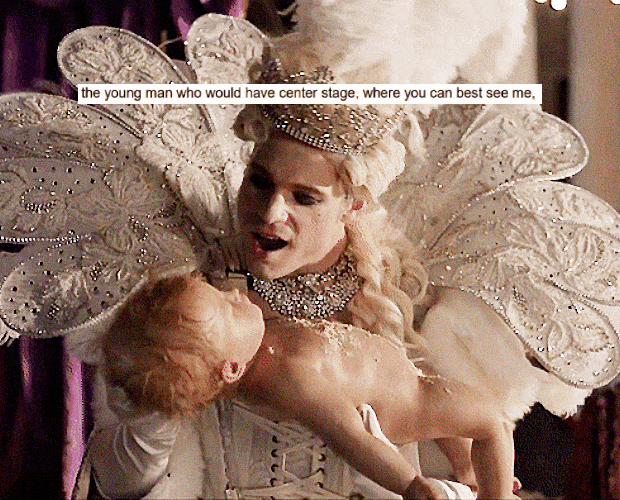
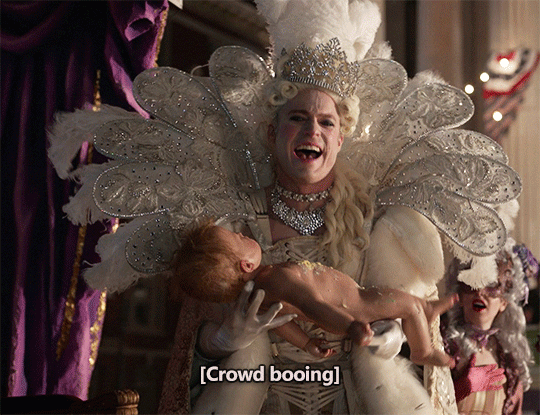
Lestat's behavior is not only derived from the time period he was born & raised in (the Rococo era of so-called "effeminate" high class dandies--a la Percy Blakeney, etc). Lestat is the embodiment of PRIVILEGE: a powerful rich white male vampire, who leans into being foreign/French White to excuse anything he does that people find strange/off/unnatural/dangerous--all the red flags. 🚩🚩🚩
And red flags brings me directly back to matadors/toreros.

@toscrollperchancetomeme
😂 TYSM! Sam Reid dropped so many juicy deets; I couldn't resist! There's so much depth to the Matador outfit, beyond the gendered aspect of bullfighting that I discussed before. Let's go back to what Sam said about Lestat, and delve deeper into matadors:

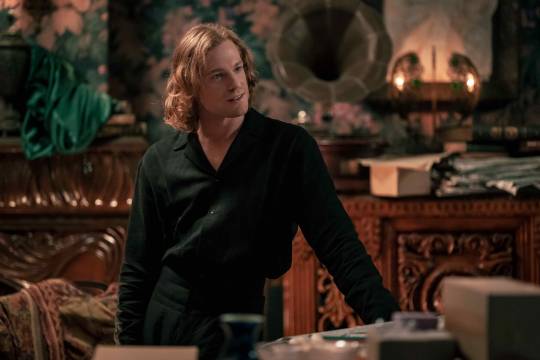
The most iconic apparel worn by toreros ("bullfighters") / matador de toros ("killer of bulls") in Spanish bullfighting is the Traje de Luces, the "Suit of Lights." The colors are usually bright & vivid, as part of the showmanship & pizzazz. Darker palettes are less common, as shiny sequins (the luces/lights) became part of the standard fit.


However, Lestat's all-black Matador outfit from what Sam called the "villain sequence" in Ep5 seems to be loosely following the style of a different but very closely related outfit, the Traje Campero "Rural/Countryside Suit" aka Traje Corto ("Short Suit").
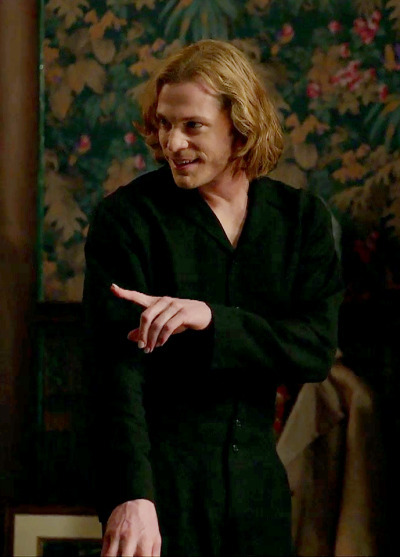
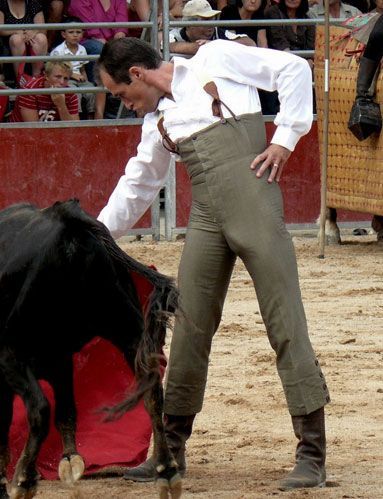
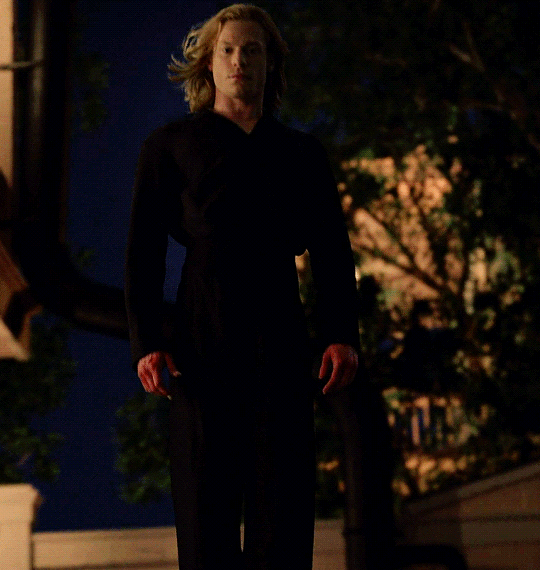
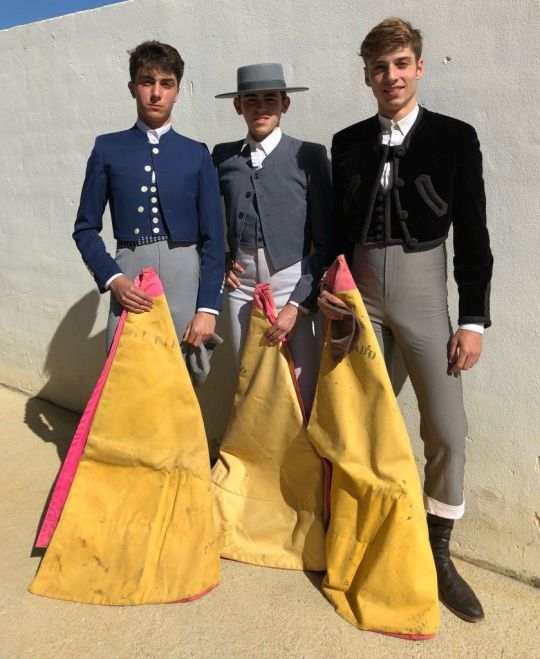
(These costumes are typically worn during ceremonial parades and a very specific festival I'll get back to in a moment, cuz it's important.) Unlike the Suit of Light's sequins & silk, the Rural Suit is made of suede, leather, or velvet, in dark muted colors. The pants can be light or dark, striped & patterned, with or without chaps (also found in gentleman's uniforms of military officers and cowboys).
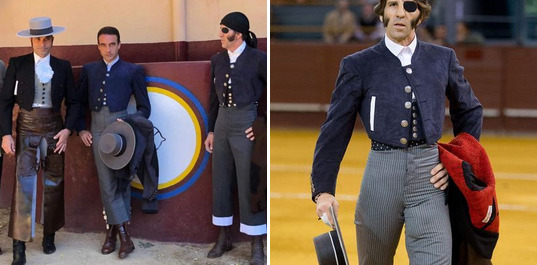
The trajes originated from "the flamboyant costumes of the 18th-century dandies and showmen involved in bullfighting, which later became exclusive to the bullfighting ritual." (Wikipedia)
The ancestor of both trajes (luces/campero) is traditional 17th-19th century Andalusian clothing (Andalusia being the home of Spanish bullfighting), closely associated with a very particular type of masculine dandyism. (The campero/corto is also the costume worn by Andalusian male flamenco dancers.)
"Before the 17th century the profession of bullfighting did not exist as such, and the fighters did not wear luxurious & shiny trajes de luces, but instead normal clothes of the time according to the social class to which the bullfighter belonged. The first bullfighter trajes de toreros appeared in the 17th century, when professional bullfighters from Navarre & Andalusia wore characteristic garments with their gangs to participate in performances and thus differentiate themselves from other bullfighter bands." (translated/truncated from Spanish website)
In the mid-1700s, Francisco Romero revolutionized professional bullfighting by establishing the first matadors who fought on foot, heroically fighting the bull face to face with swords & the muleta (iconic red flag) in a dance-like performance, dressed in a suede/velvet coleto (jacket), a precursor to the traje campero. Romero (from a carpenter family) wanted to show off & stand out from the nobility, and changed the game entirely, through a form of social resistance-turned-innovation.
"At that time, bullfighting on horseback was more important, which was considered a sport and not a show. Bullfighting on foot was not yet widely recognized." (translated from Spanish website)
Bull-killing on horseback was practiced by Spanish noblemen, attended by lower class assistants on foot. Romero was the first to make on-foot matadors the stars of what was increasingly becoming a dandified show/performance/dance. Matador Joaquin "Costillares" Rodríguez introduced even more showmanship, competing against Francisco Romero's grandson Pedro Romero (famously painted by Goya--bottom right).
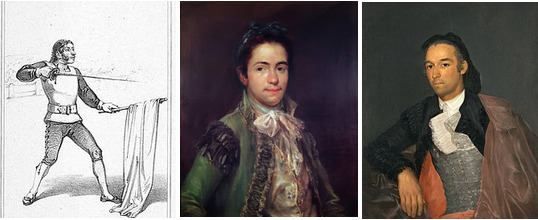
For his matches, Costillares (middle) dressed in flashy silks, threaded in shiny silver braiding; the precursor to modern traje de luces. Like Francisco Romero (left), Costillares wanted to show off & stand out; and revolutionized the male image of the bullfighter through clothes.
In 18th-19th century Andalusian Spain there were 2 types of dandy: the French-imported upperclass petimetre (effeminate dandy), and the indigenous working class majo (masculine/macho dandy).
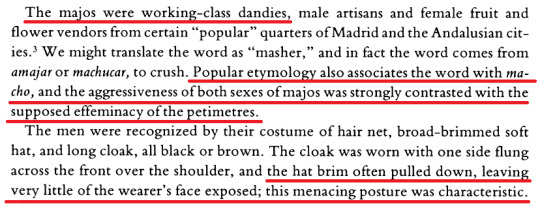
Noyes, Dorothy. “La Maja Vestida: Dress as Resistance to Enlightenment in Late-18th-Century Madrid.” The Journal of American Folklore 111, no. 440 (1998): 197–217. https://www.jstor.org/stable/541941
The majo, like many dandies, became the peak of Andalusian fashion, across all social classes; and torero/matador outfits weren't the only ones to take cues from them:

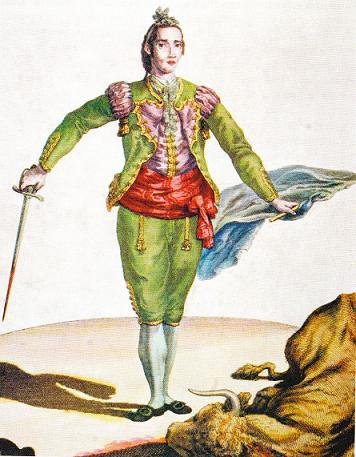
18th-19th century majos "distinguished themselves by their elaborate outfits and sense of style in dress and manners, as well as by their cheeky behavior. The majos outfits were exaggerations of traditional Spanish dress. The style stood in strong contrast to the French styles affected by many of the Spanish elite under the influence of the Enlightenment. Majos were known to pick fights with those they saw as afrancesados ("Frenchified" – fops)." (Wikipedia)
The majos' flamboyant/cheeky/saucy/exaggerated behavior was aggressively masculine; a lower/working class resistance to social mores imposed on them by (foreign) elites, whom they saw as more feminine, and FOUGHT against, to reaffirm their masculinity. These dandies were violent, brazen non-conformists; as beautiful & stylish as they were dangerous. And matadors/toreros knew that the bullfight was the perfect arena to exemplify the spirit of the majos through the dandified performance art/sport of killing bulls--a universal cultural symbol of masculine prowess & strength. Spanish bullfighting used to belong solely to the aristocratic equestrian sphere. Lowly pages/assistants like Francisco Romero (dressed in the precursor to the Rural/Countryside Suit), were the first to buck the system by killing bulls on foot--he likely didn't own a horse. The Romeros were from a carpenter family. Costillares was the son of a butcher. But through bullfighting they gained social status and became icons of masculinity--and dandies.
Lestat--the nouveau riche son of a poor country marquis--insists on being all the beautiful things he is without apology: masculine & effeminate alike. But like I said, it was no coincidence that Carol likened Lestat's Ep5 villain outfit with matadors--he's fighting Louis for dominance in their household, and reaffirming his place at the top of their very gendered social hierarchy, as a warning to BOTH "the housewife" AND "the prodigal daughter" he feels are threatening his authority as their Maker, so he defeats them BOTH.
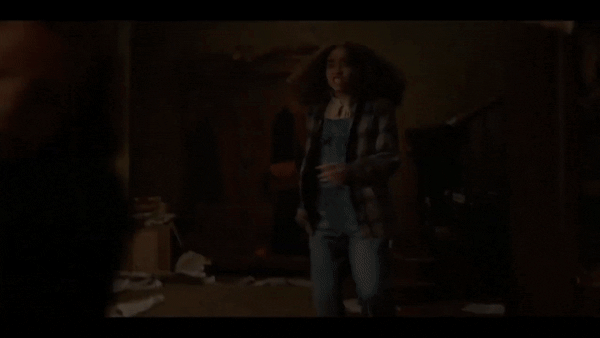
Carol Cutshall initially designed Lestat's matador pants as pajamas--loungewear. (Lestat's CASUAL & comfortable in his ability to KILL--matador means "Killer" in Spanish--and remember what I said about Louis & Claudia being put on the same parallel level in Ep5, when Claudia's attacked by "Killer" aka Bruce.) Sam said Carol made several versions of the pants; and yup, they're foreshadowed in Ep5 when Lestat first starts arguing about Louis' depression, then they pop up again in Ep7 during the Murder Plot--two instances @dwreader brilliantly linked Lestat (& Stanley Kowalski) wearing wifebeaters. (Listen, Carol, I just wanna talk.... 😅🔫)
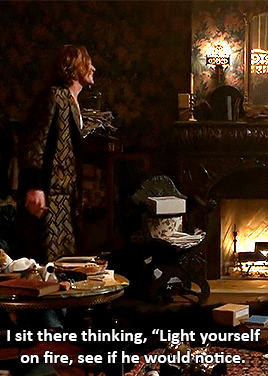

And here's my last points about Lestat's matador outfit. First there's the irony of Lestat (who grew up poor in rural France) wearing the something very similar to the matador/torero's Rural Suit, traje campero (aka Short Suit (traje corto)). But what's more interesting is that that type of Short/Rural Suit is usually only worn during special festivals called the Tienta ("trials"), not the regular corrida ("bullfights").

These Tienta are trials for young and immature bulls to be tested in the ring, to see if they're fit for breeding/fighting. 🤯 FLEDGLINGS. And who's Lestat's young bull? "Built-like-a-bird" Claudia. Who's the immature bull? The "biggest rat eater of them all," the under-developed "botched" vampire Louis. During these trials, veteran matadors can show off their skills; and novice bullfighters are shown the ropes and prove themselves. Like I said: the matador wins again.
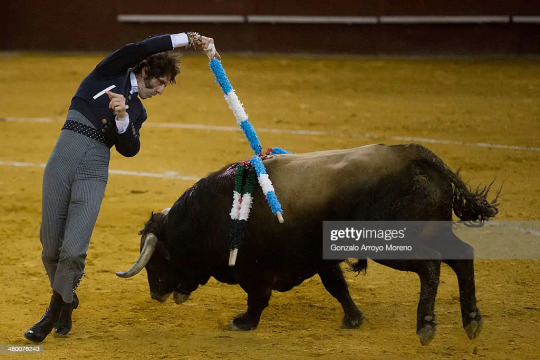
God, even the way Lestat dragged Louis' bloody body out of the courtyard by the jaw/neck resembles the way the defeated bull--bled out & stabbed in the neck--is dragged by the neck out of the ring.
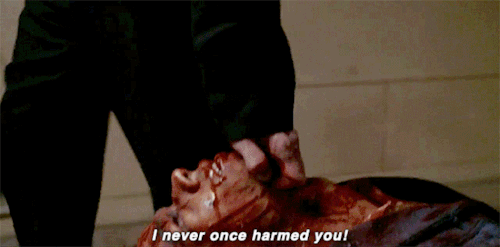
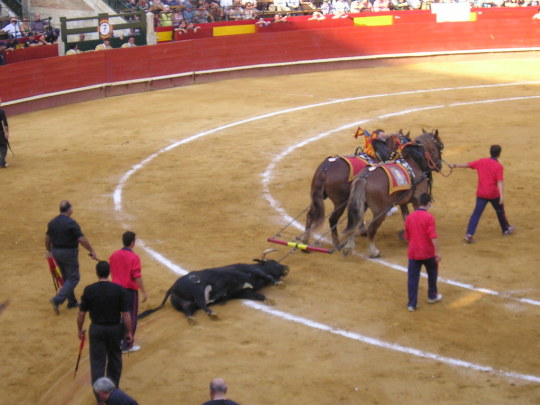
And remember what I said about Lestat and FOOD. Cuz what happens to the bulls after the matadors kill them? They're sent to the slaughterhouse to be butchered for FOOD. People EAT the bulls.


So yeah, my whole point in this post and my first one is not to sleep on guys like Lestat, Percy--or even other famous dandies like Valmont from Dangerous Liasions/Cruel Intentions (mentioned by both @little-desi-historian and @dwreader)--just because they're effeminate--especially when they're emulating mannerisms from a time period where the model of what made a fashionable gentlemen/good breeding/elite society did NOT match modern expectations about gender. People are getting distracted by Lestat's yaasified manner, not what the show itself is signalling through the relationships he has with others.
This show is deliberately painting Lestat as a villain through Louis' & Claudia's perspectives, as they were the ones who suffered under his Reign of Terror. The symbolism behind the matador-inspired costume used in Ep5 reflected gendered social hierarchies embedded within bullfighting culture (in Spain, women only started being allowed to fight in the 19th-20th centuries). Dressed in clothes resembling that of a matador, Lestat beating & defeating Louis mirrored the defeat of the emasculated bull, and the reification of the victor's masculine prowess at the top of the foodchain.
#the vampire lestat#lestat de lioncourt#male fashion#fashion history#gender inequality#read a dang history book#operation matador#iwtv tvc metas
356 notes
·
View notes
Text
Charles Alston: A Luminary of the Harlem Renaissance and Beyond
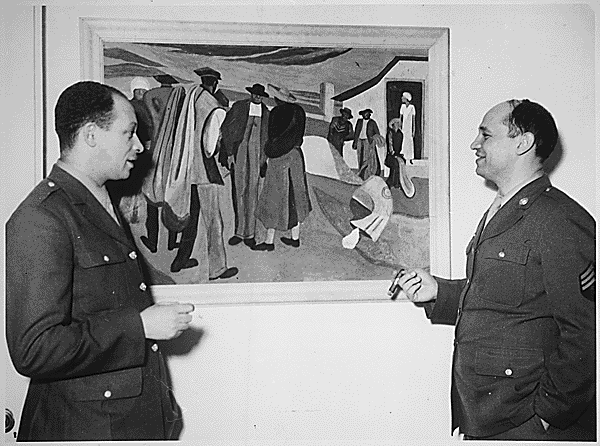
In the heart of the Harlem Renaissance of the 1920s and 1930s, Charles Alston emerged as a beacon of creativity and activism, blending the vibrancy of African American culture with profound social commentary. As a pioneering African American artist and educator, Alston’s legacy is celebrated for its dynamic impact on Black art and cultural expression during the 20th century. His work, which includes murals, illustrations, and sculptures, showcased his contributions to the Harlem Renaissance and his role in uplifting African American heroes through art.


Alston’s murals, commissioned by the Federal Art Project of the New Deal-era Works Progress Administration, adorned public spaces, bringing the narratives of the African American experience to a broader audience. His role during World War II, creating illustrations for the Office of War Information, further exemplified his commitment to using art as a tool for advocacy.


These illustrations, many of which are preserved in the National Archives, underscored the contributions of African Americans to the war effort, challenging the racial prejudices of the era. Alston also designed and painted murals at the Harlem Hospital and the Golden State Mutual Life Insurance Building. In 1990, Alston's bust of Martin Luther King Jr. became the first image of an African American displayed at the White House.
Beyond his artistic endeavors, Alston’s mentorship of future luminaries like Romare Bearden highlight his dedication to nurturing the next generation of artists. This mentorship underscored his belief in art’s power to foster community, inspire change, and bridge cultural divides in the United States. His influence extended to the civil rights movement, where his art continued to serve as a catalyst for social justice.

Charles Alston’s work remains a testament to his visionary blend of art and activism. For those interested in exploring Alston’s enduring impact and the rich tapestry of the Harlem Renaissance, the National Archives offers a treasure trove of resources:
Fully Digitized Artworks: https://catalog.archives.gov/search?availableOnline=true&page=2&q=Charles%20Alston&typeOfMaterials=Photographs%20and%20other%20Graphic%20Materials
https://catalog.archives.gov/search?availableOnline=true&page=2&q=Charles%20Alston&typeOfMaterials=Photographs%20and%20other%20Graphic%20Materials
84 notes
·
View notes